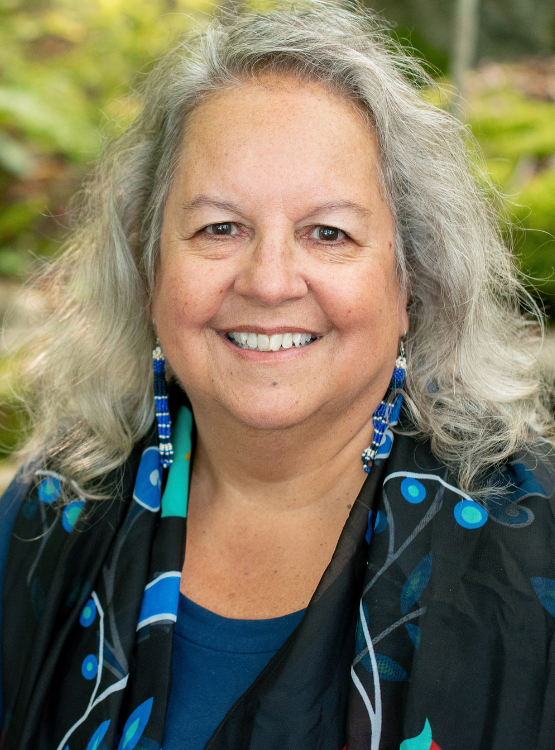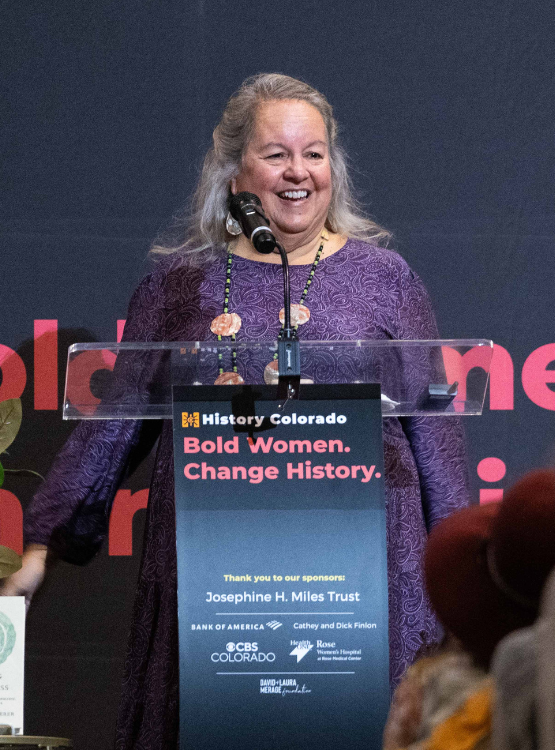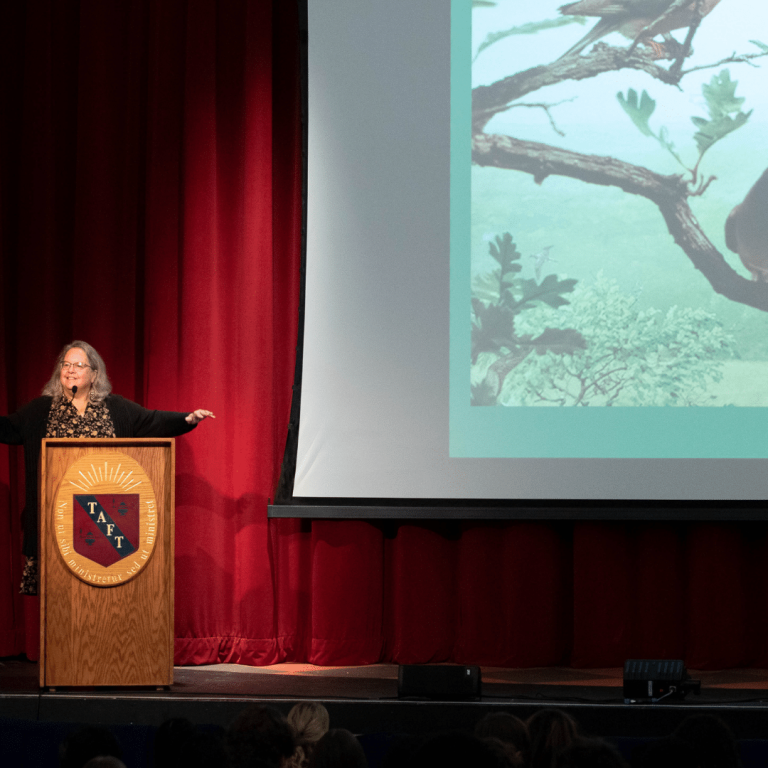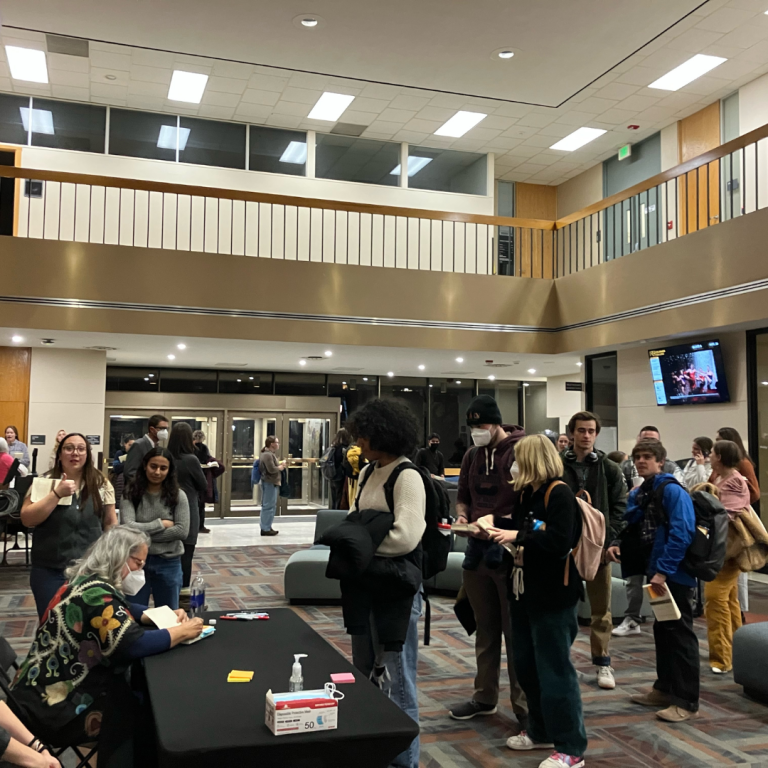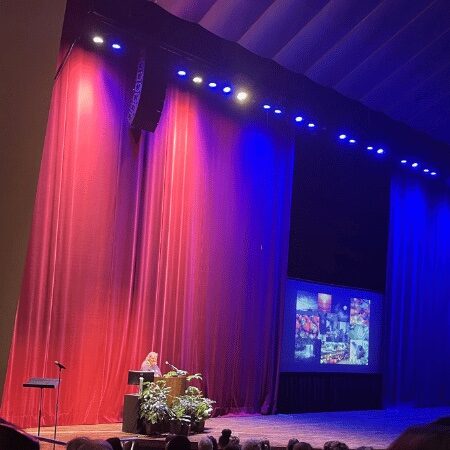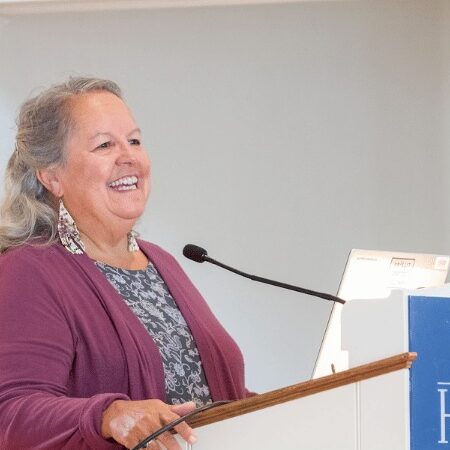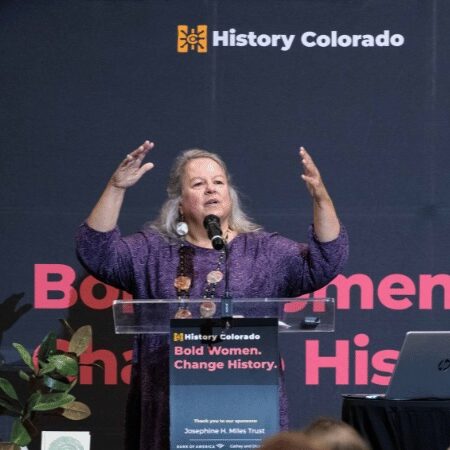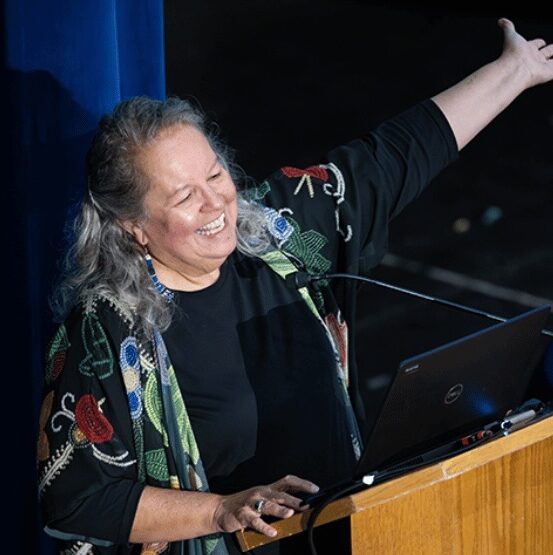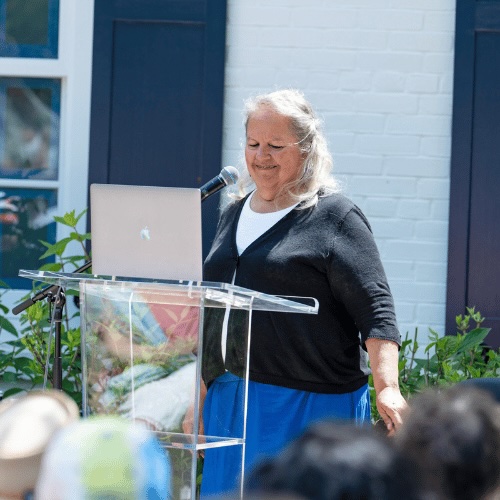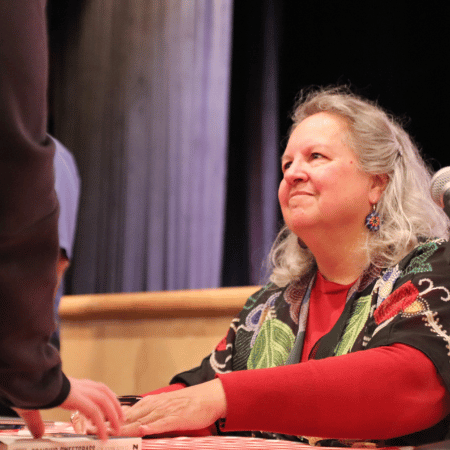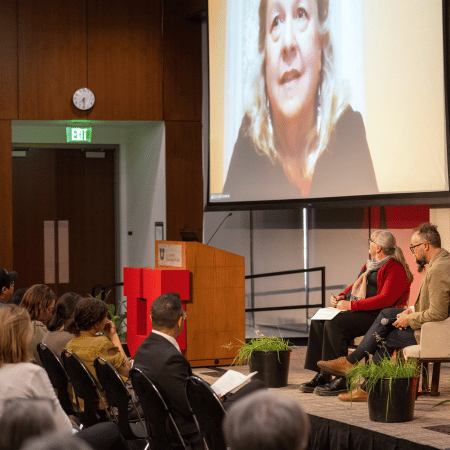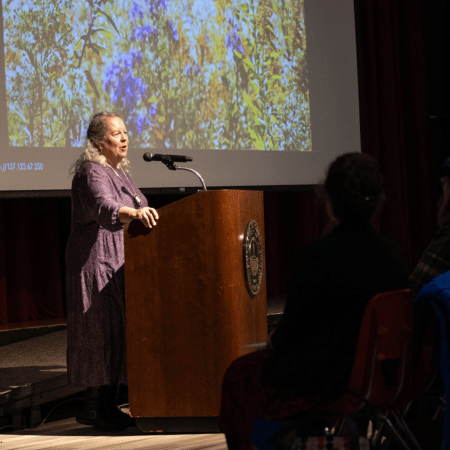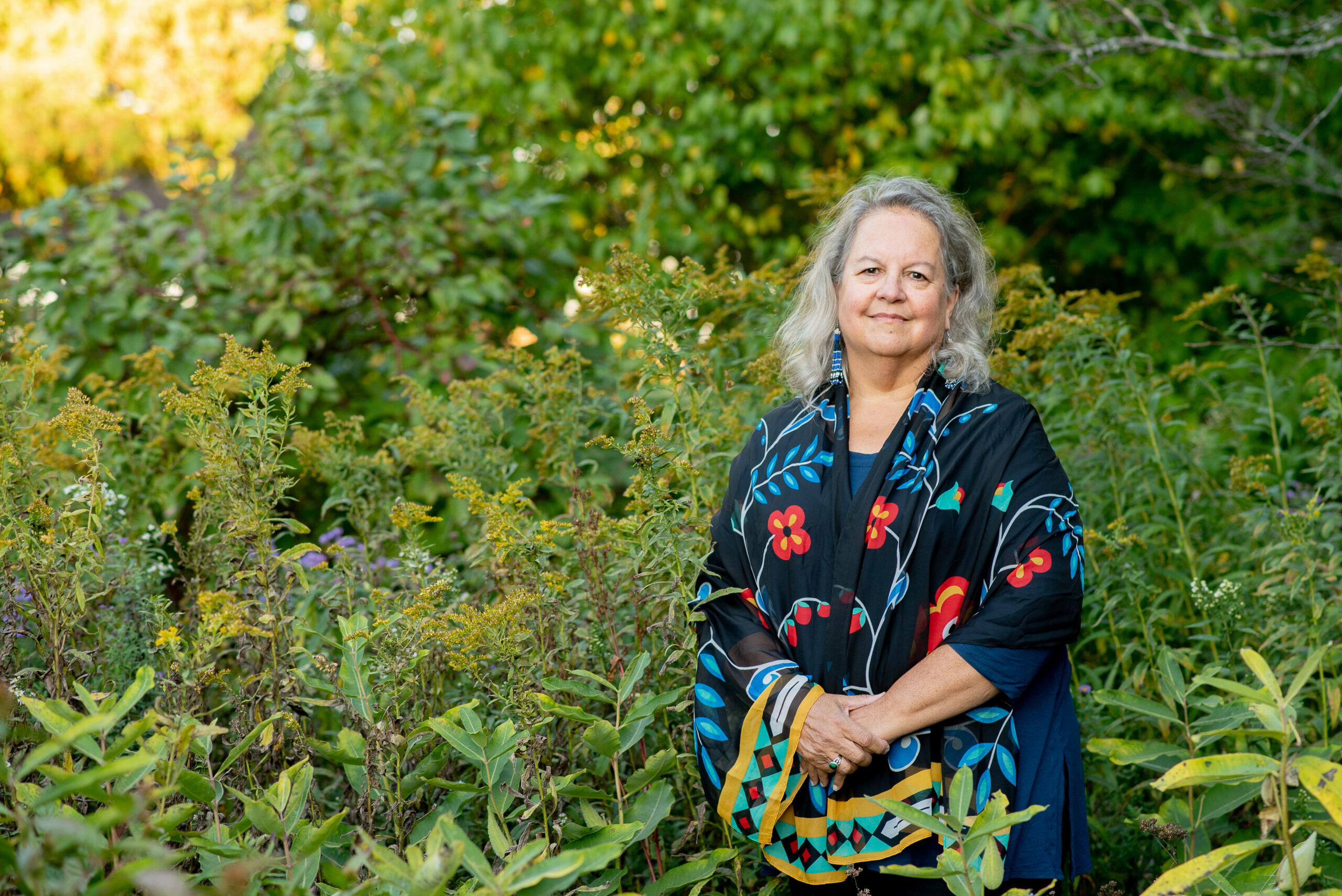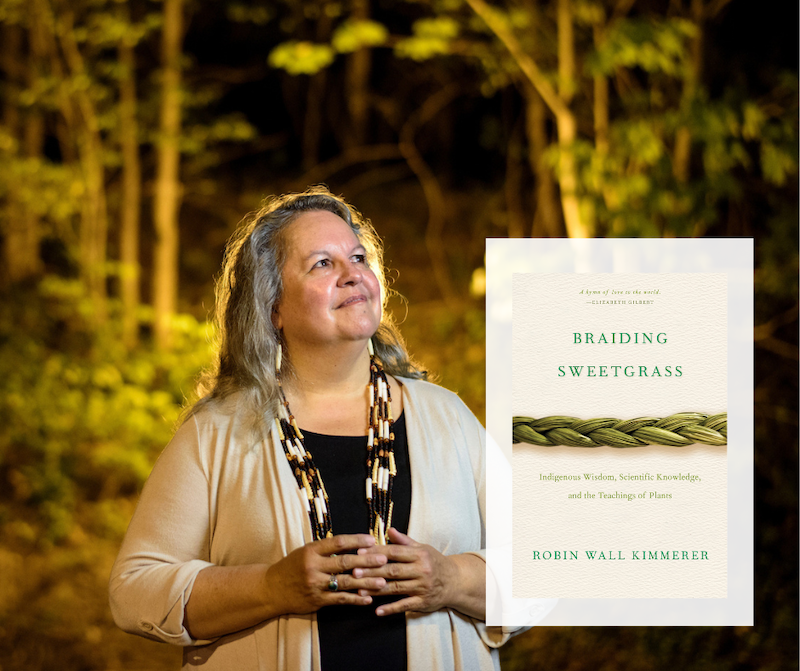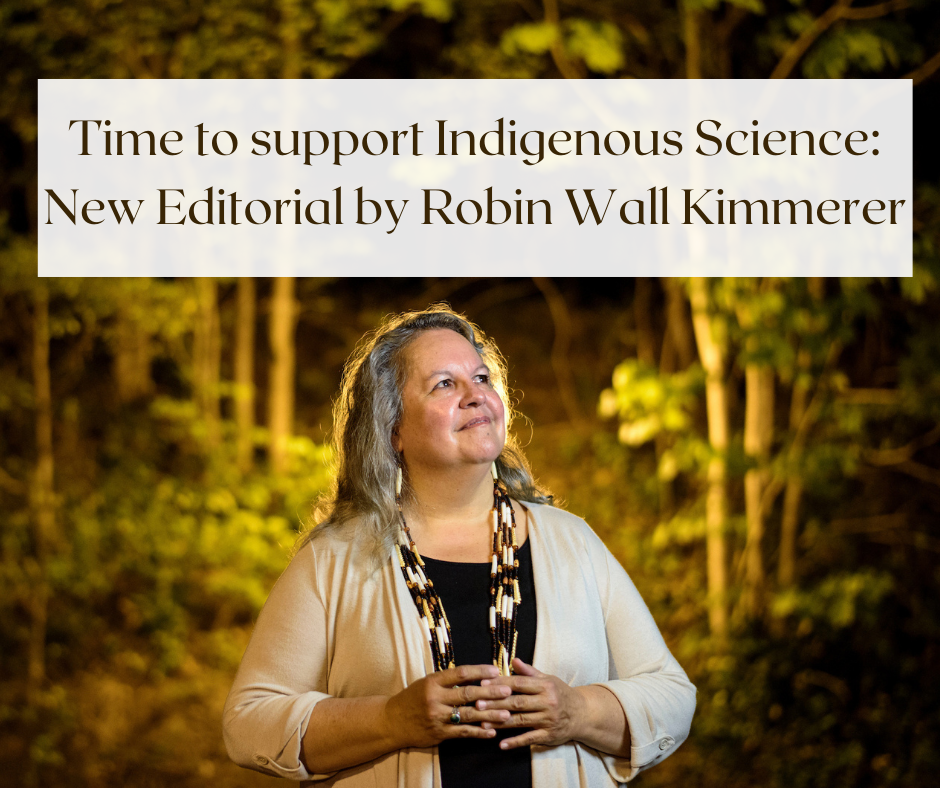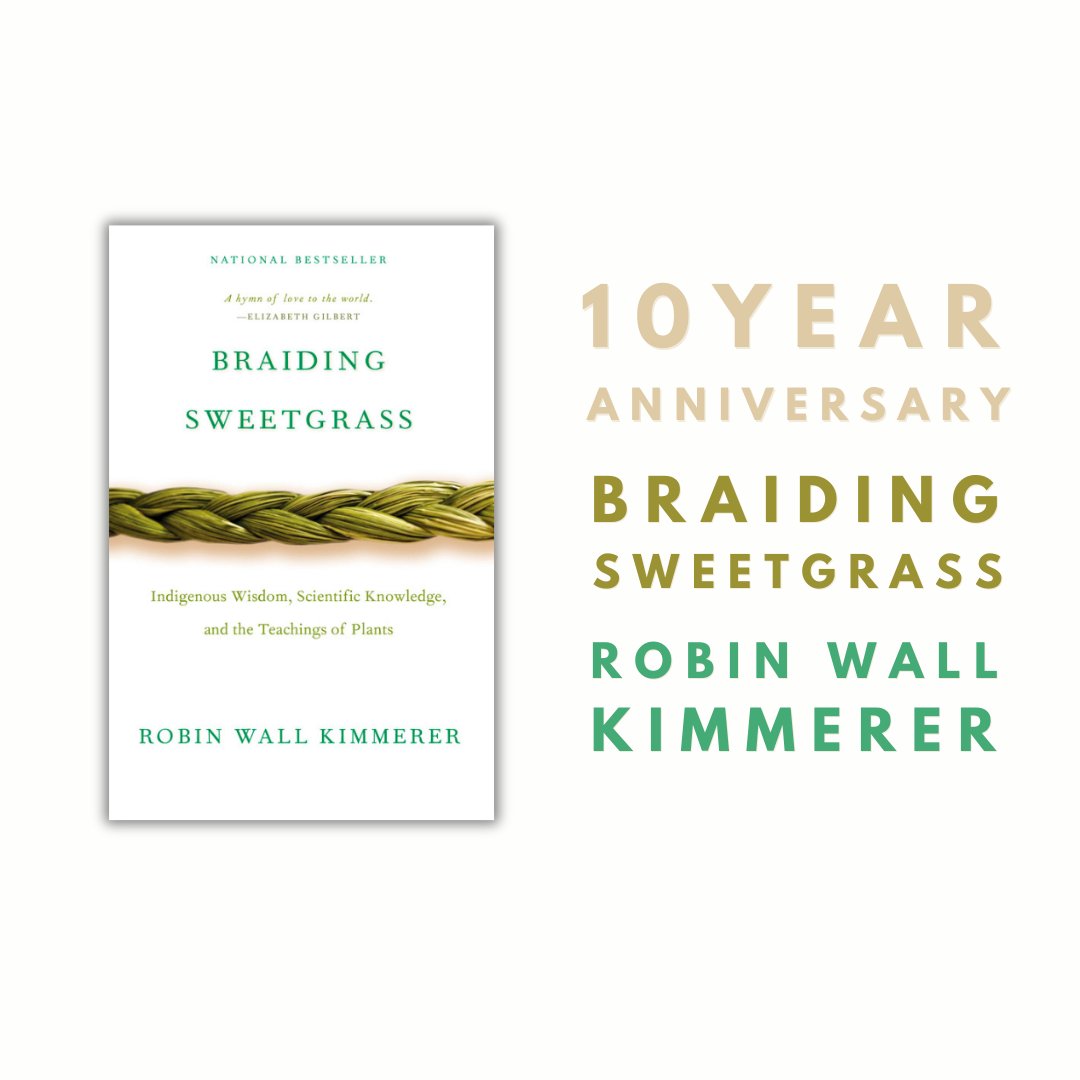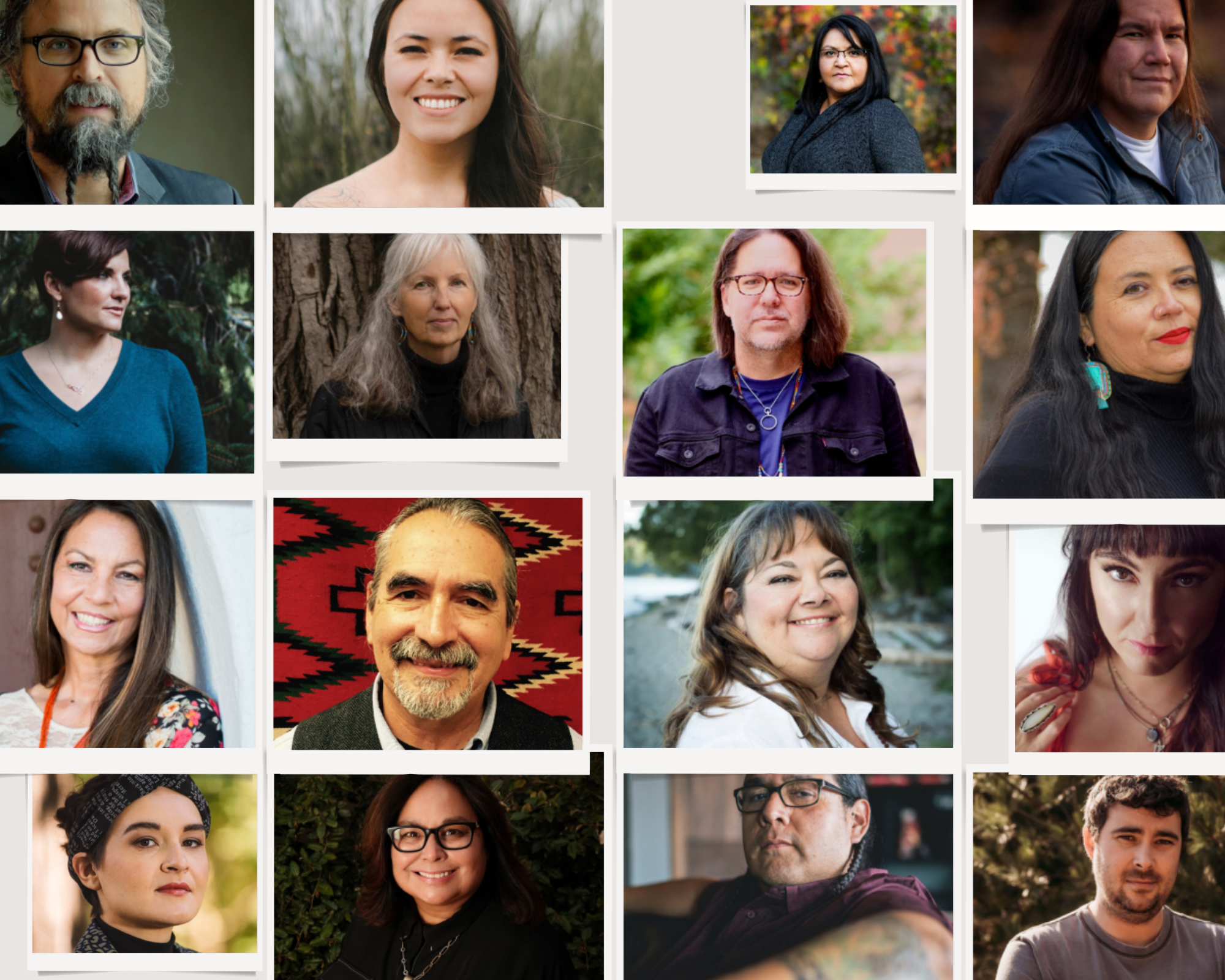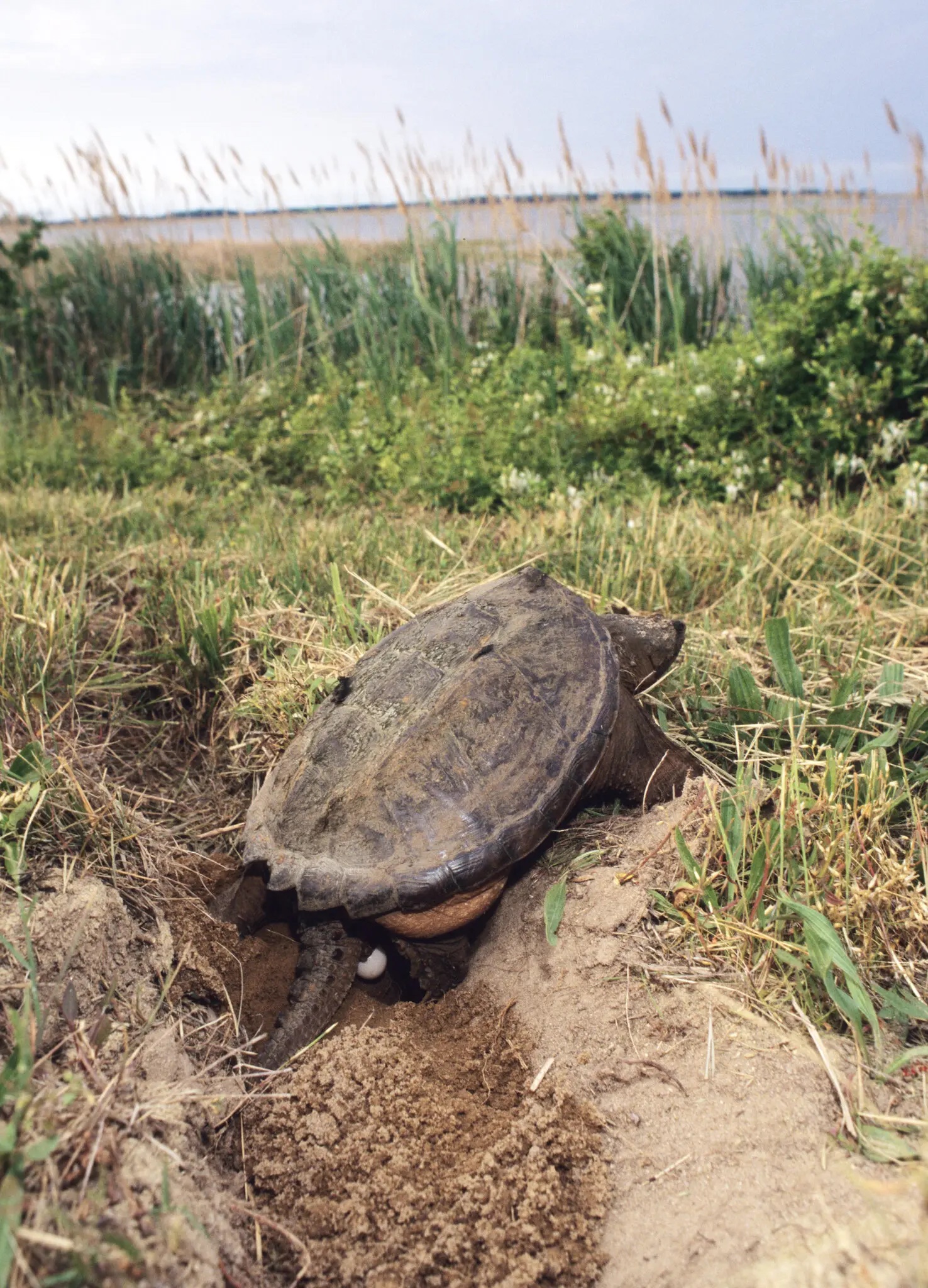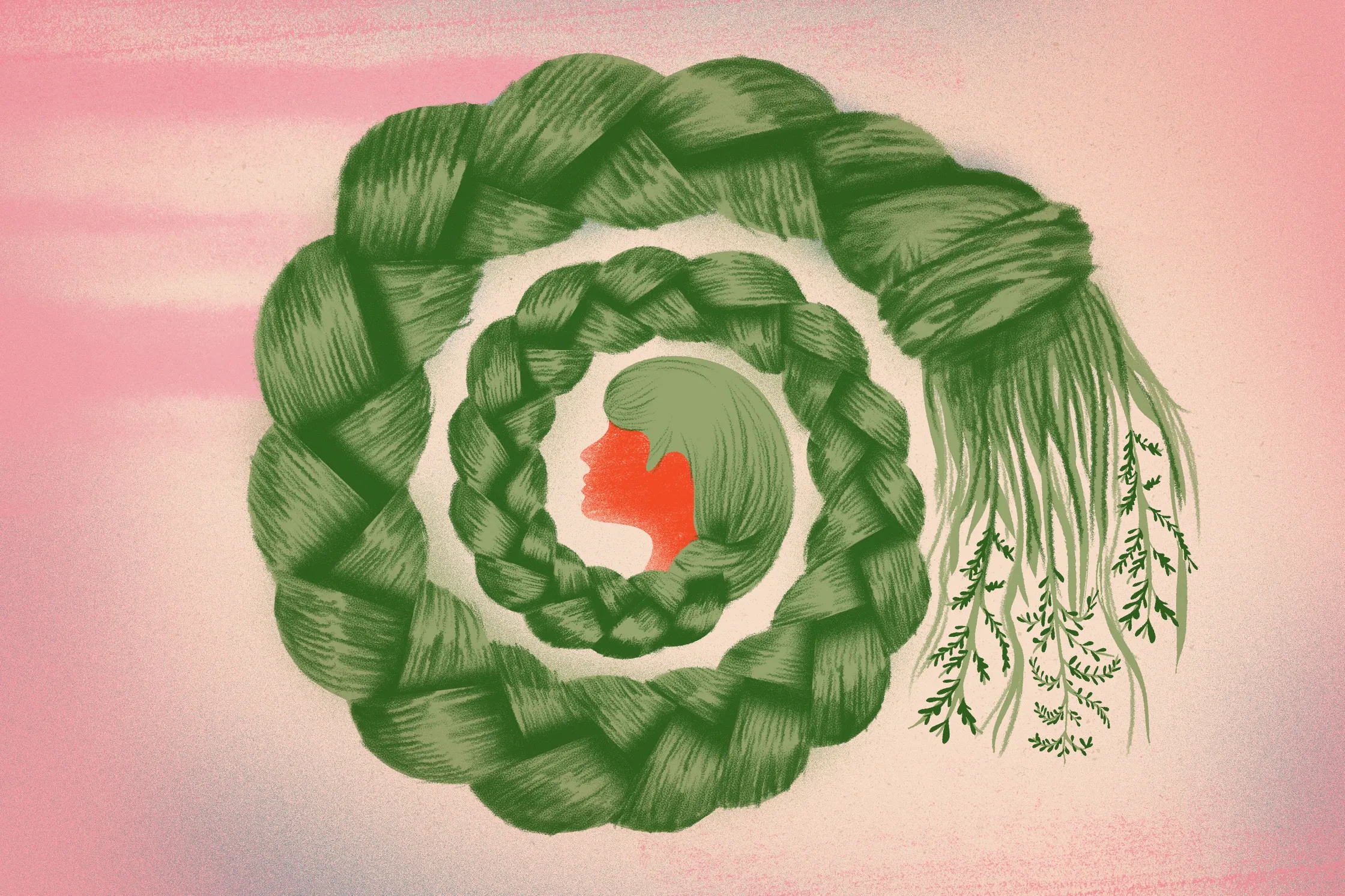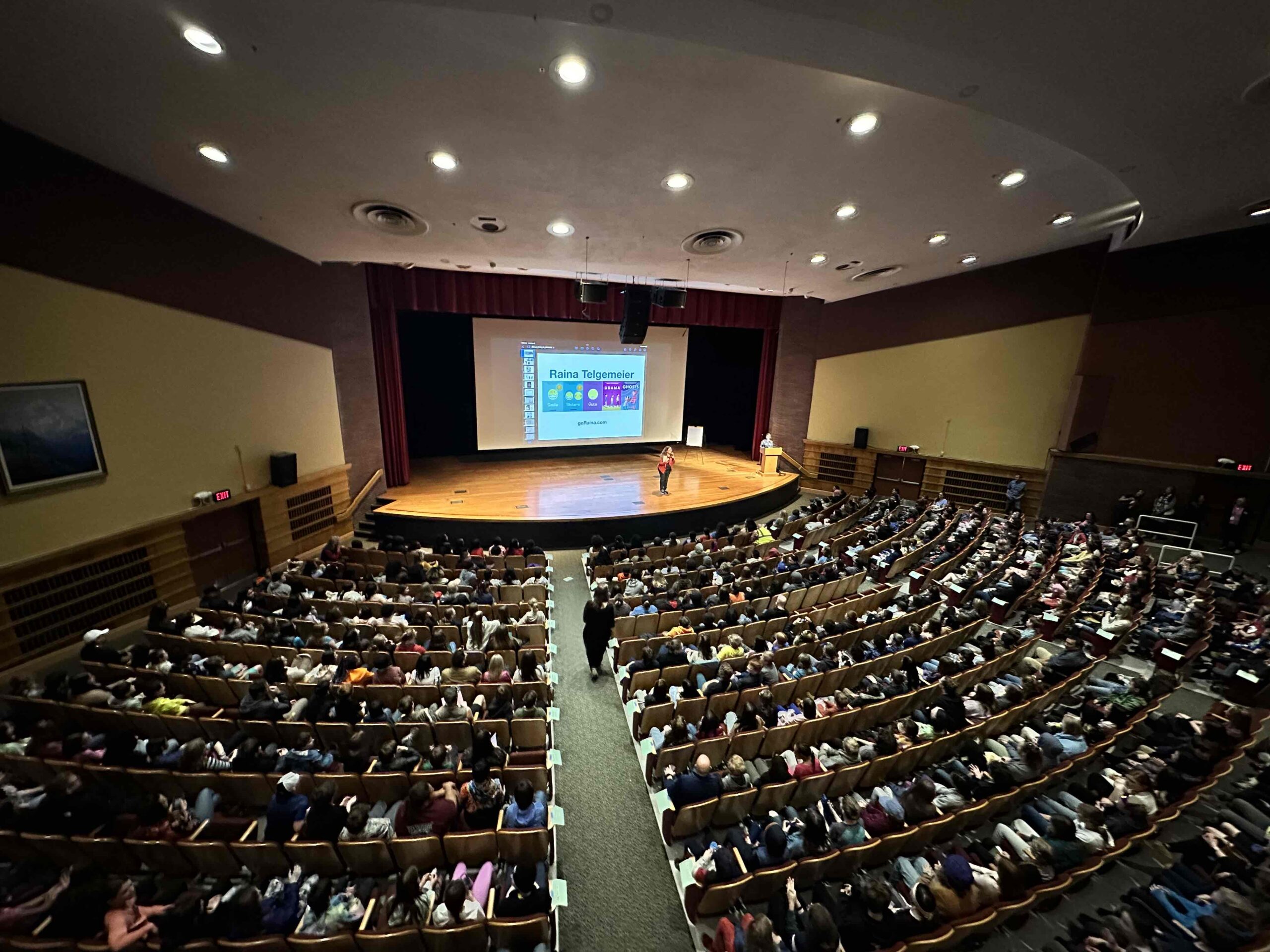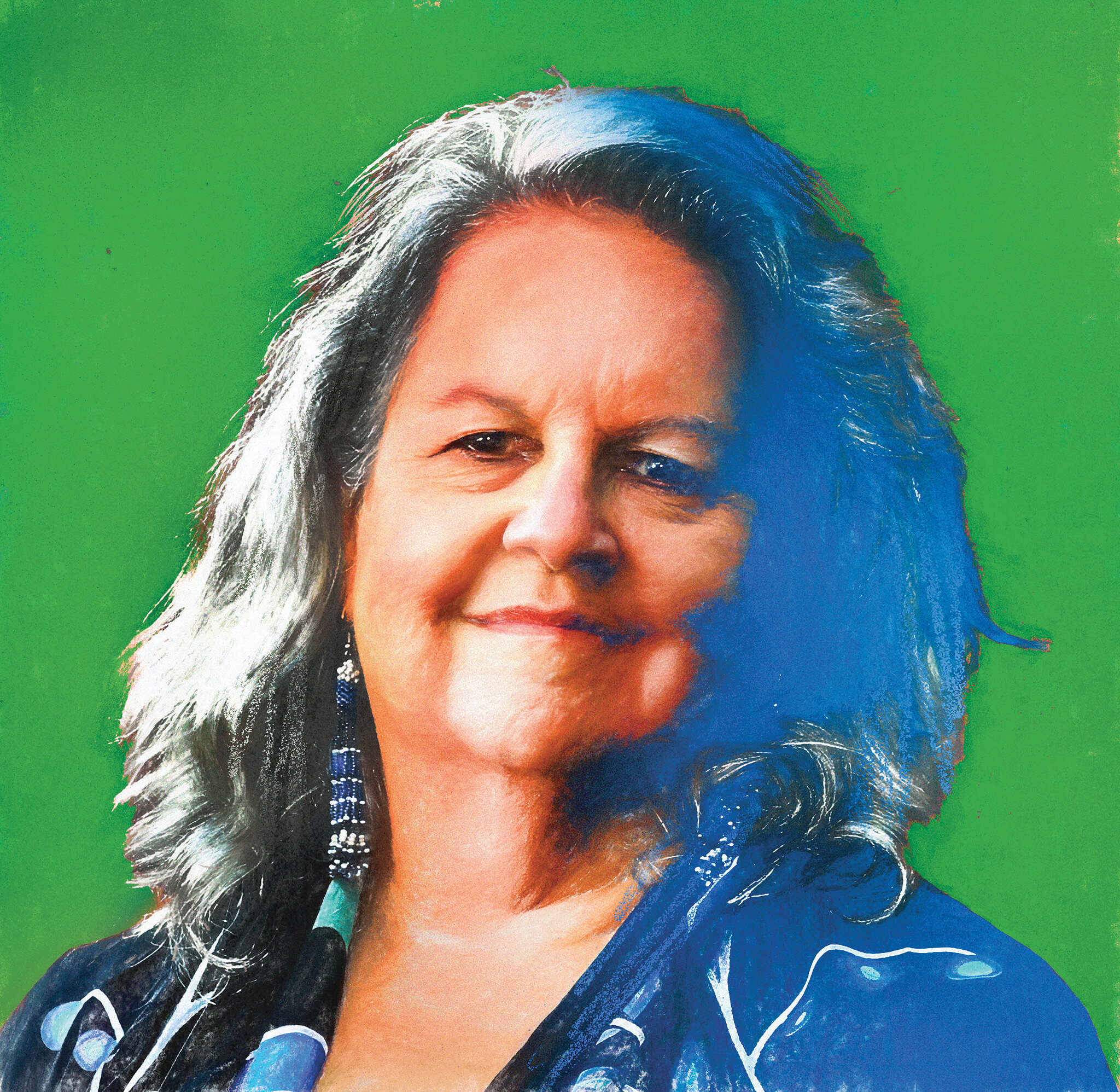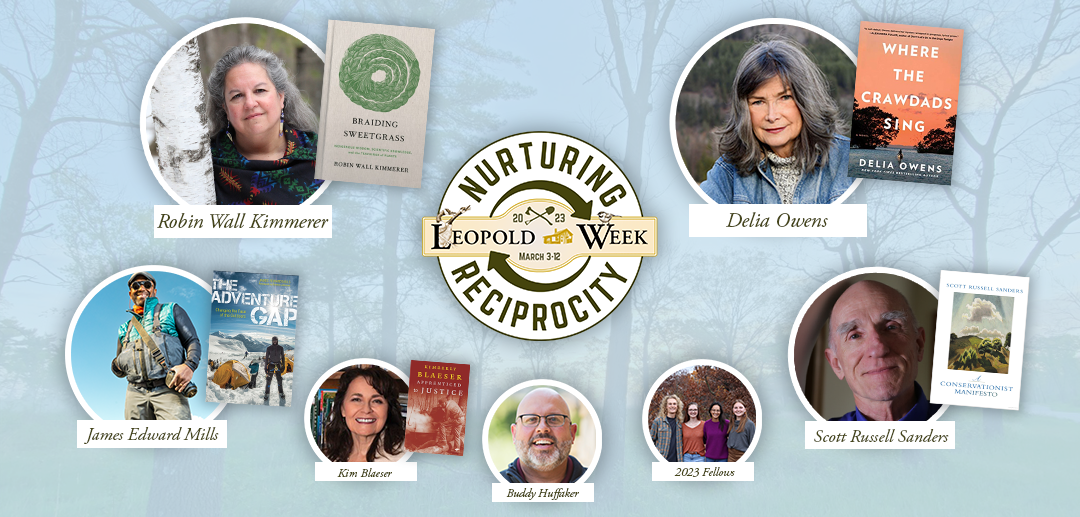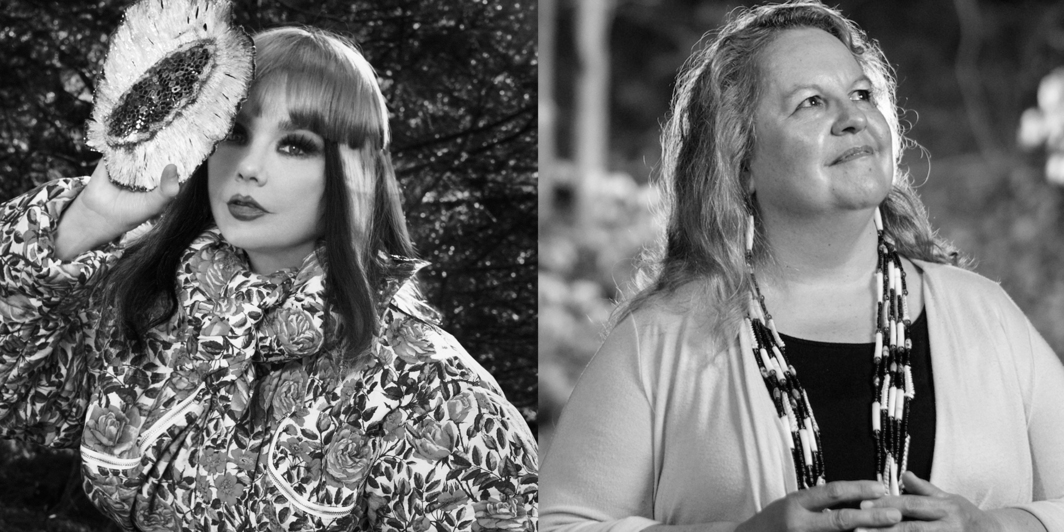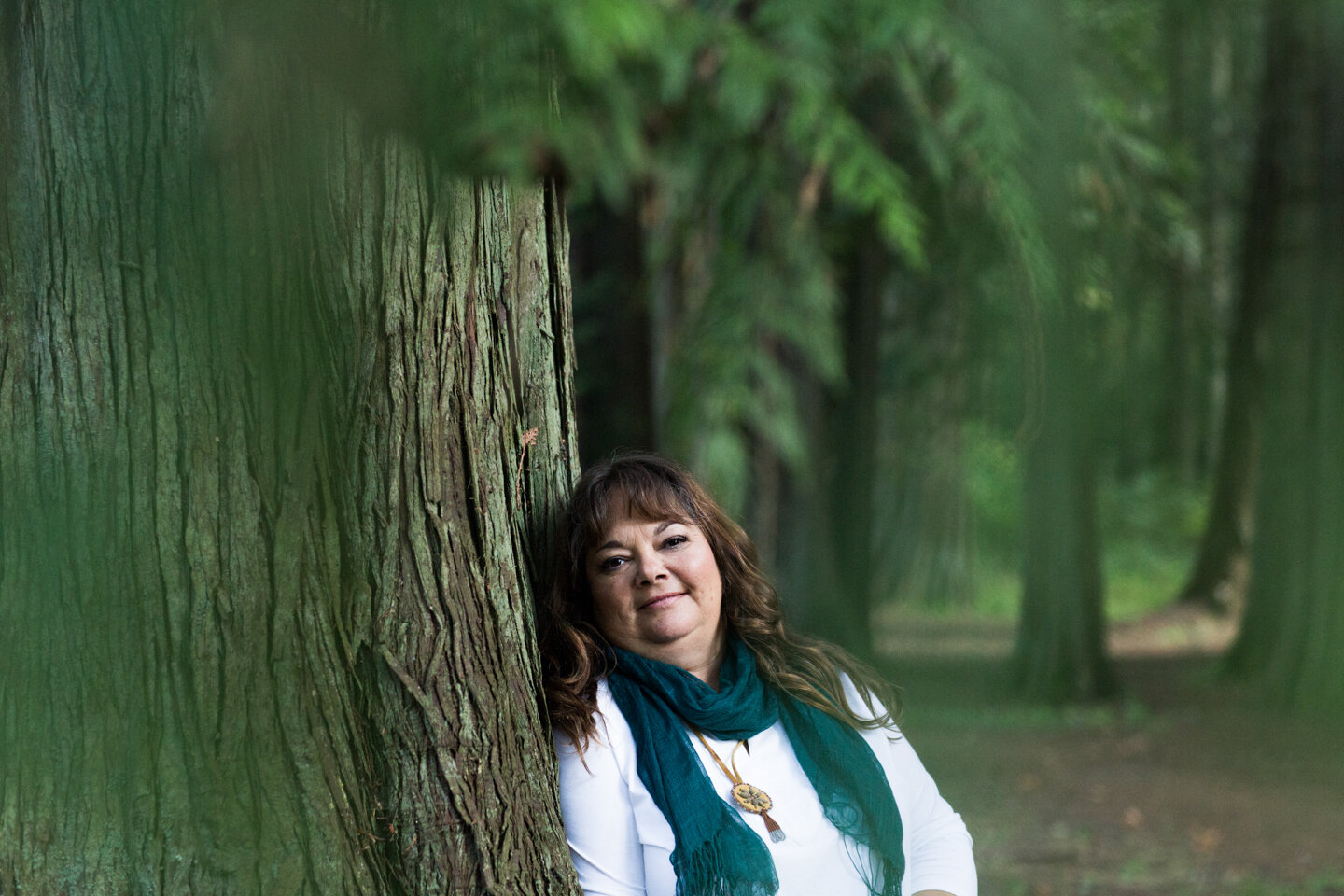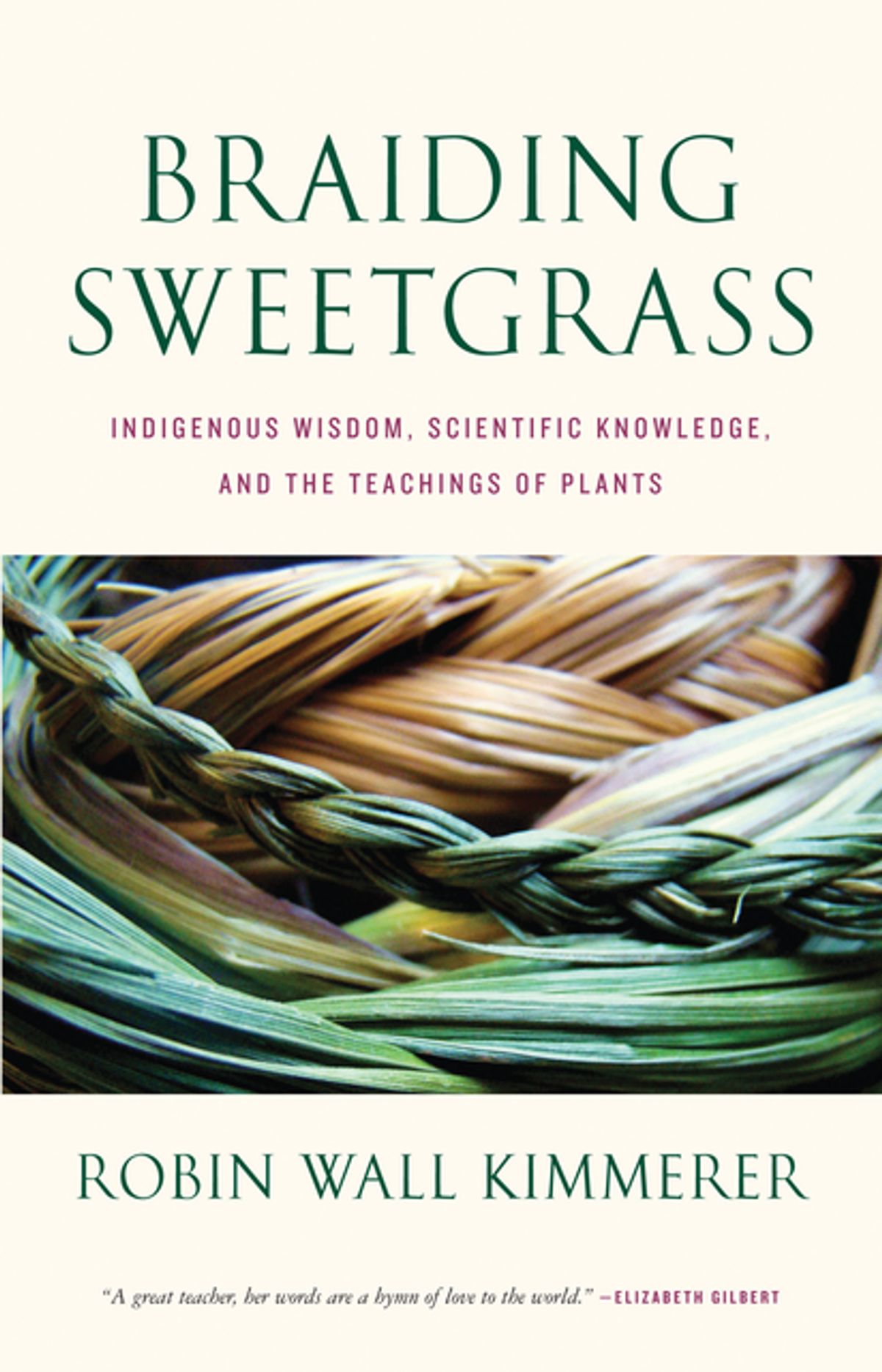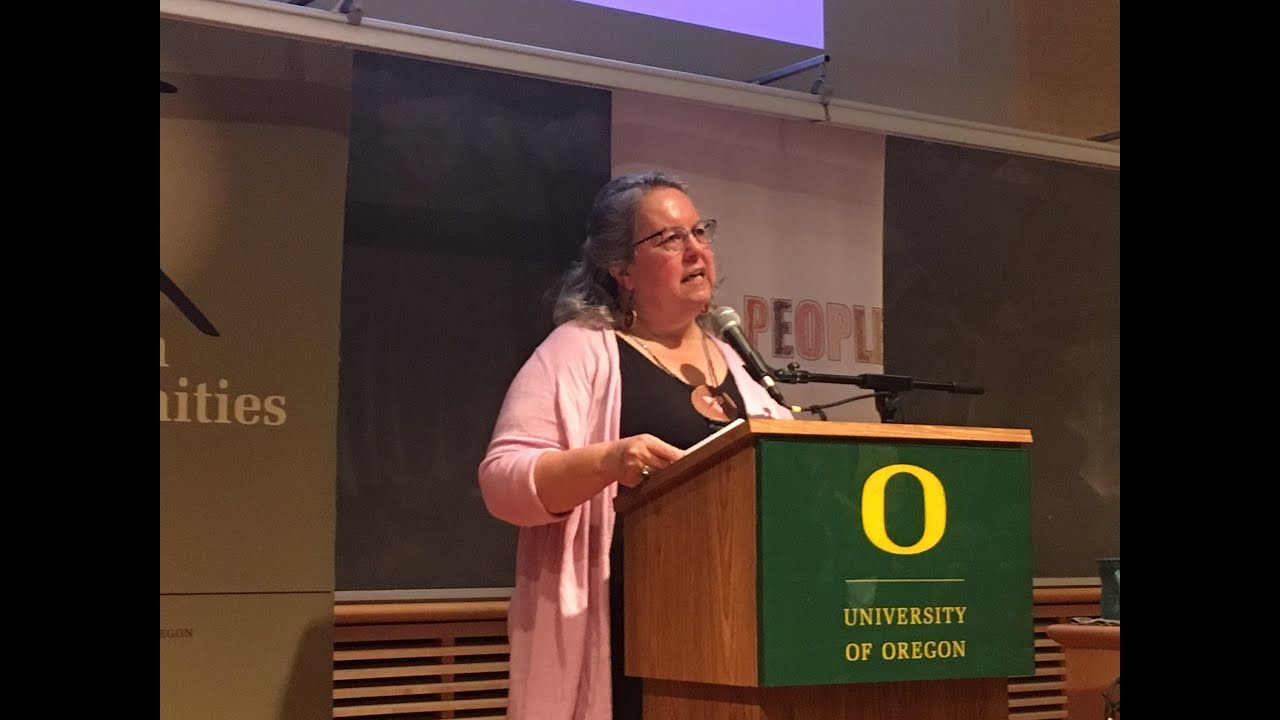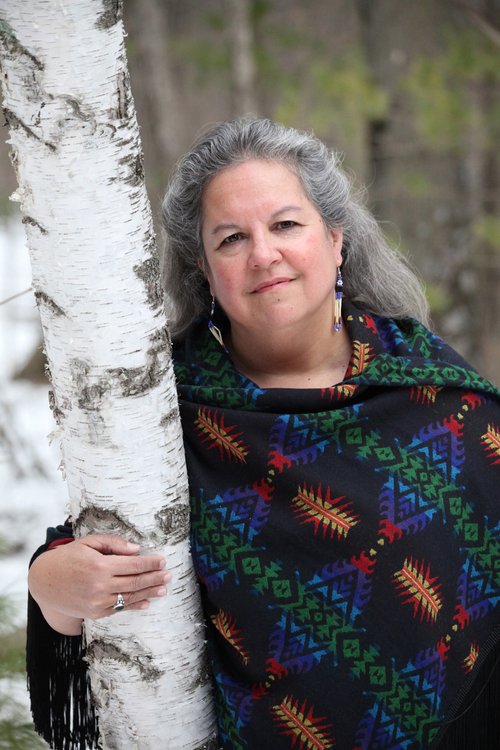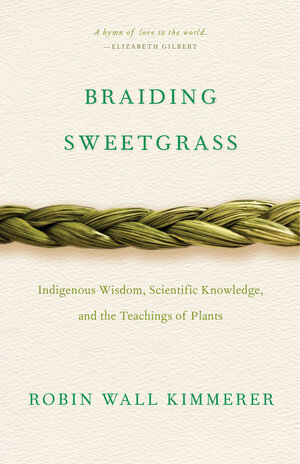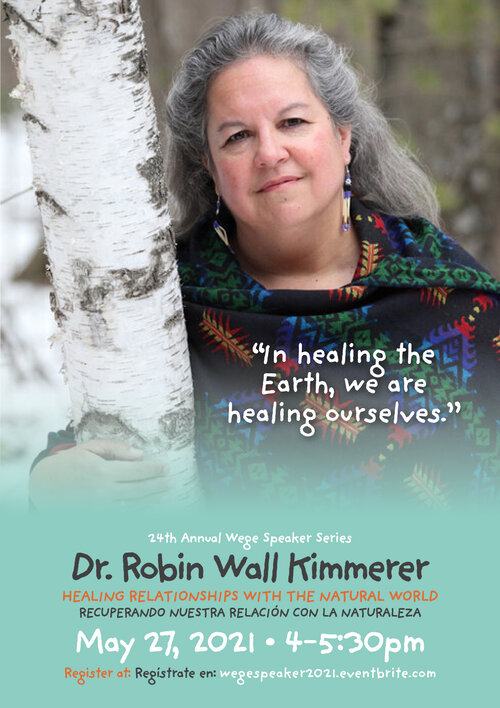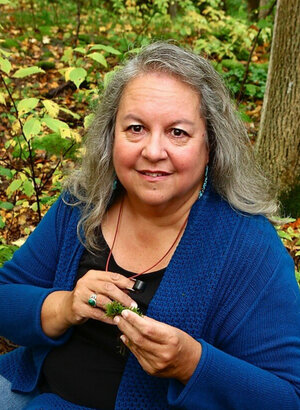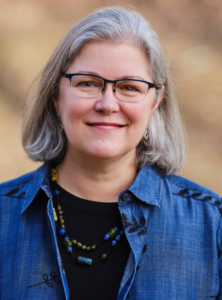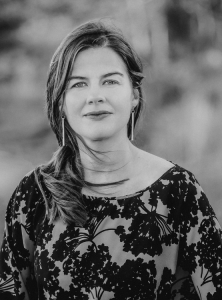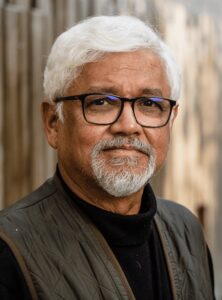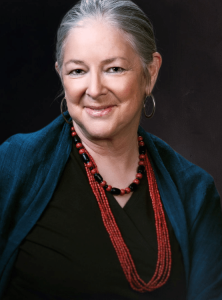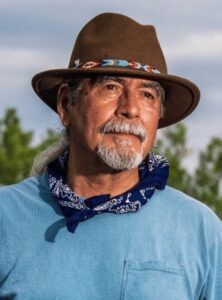 “Dr. Kimmerer spoke with grace and insight, weaving together science, storytelling, and Indigenous teachings in a way that invited reflection and inspired hope. Her message of reciprocity and care for the earth resonated strongly with our community and the museum’s mission to honor Indigenous knowledge and traditions of the Great Lakes.” — Gichigamiin Indigenous Nations Museum, 2025
“Dr. Kimmerer spoke with grace and insight, weaving together science, storytelling, and Indigenous teachings in a way that invited reflection and inspired hope. Her message of reciprocity and care for the earth resonated strongly with our community and the museum’s mission to honor Indigenous knowledge and traditions of the Great Lakes.” — Gichigamiin Indigenous Nations Museum, 2025
 “We are deeply grateful for her generosity and thoughtful engagement with guests throughout the evening. Her visit left a lasting impact on all those who attended and will continue to guide and inspire our work for years to come.
“We are deeply grateful for her generosity and thoughtful engagement with guests throughout the evening. Her visit left a lasting impact on all those who attended and will continue to guide and inspire our work for years to come.
Robin Wall Kimmerer exemplifies what it means to truly walk the walk and talk the talk. She is deeply admired by so many, and she meets each person with remarkable grace, humility, and understanding. We were honored to recognize her at our environmental education fundraiser, where she took the time to genuinely engage with our mission. Her presence and powerful words deeply resonated with our community—and no doubt played a key role in helping us reach our highest fundraising total to date.” — Aspen Center For Environmental Studies, 2025
 “I can only recall a few times in my life when listening to a speaker changed the way I think and made me want to be a better person and a better contributor to this planet.” — Toledo School for the Arts, 2025
“I can only recall a few times in my life when listening to a speaker changed the way I think and made me want to be a better person and a better contributor to this planet.” — Toledo School for the Arts, 2025
 “Robin Wall Kimmerer is an inspirational wisdom holder. She shares her knowledge with kind generosity. It is a joy to listen her. Many of the audience spoke about how seeing/hearing Robin in person was a “bucket list item” for them… her books changed their lives.” — Wabano Centre for Aboriginal Health, 2025
“Robin Wall Kimmerer is an inspirational wisdom holder. She shares her knowledge with kind generosity. It is a joy to listen her. Many of the audience spoke about how seeing/hearing Robin in person was a “bucket list item” for them… her books changed their lives.” — Wabano Centre for Aboriginal Health, 2025
 “Hosting Robin Wall Kimmerer was an absolute honor and a truly enriching experience for our campus and community. Through her thoughtful lectures and engaging storytelling, Kimmerer inspired deeper connections to the natural world, encouraging us all to consider our roles as caretakers of the Earth. Her visit not only broadened perspectives on ecological stewardship but also reinforced the power of storytelling in fostering understanding and empathy. We are deeply grateful for the opportunity to welcome her to our institution and look forward to continuing the important conversations she sparked.” — University of Pittsburgh at Bradford, 2025
“Hosting Robin Wall Kimmerer was an absolute honor and a truly enriching experience for our campus and community. Through her thoughtful lectures and engaging storytelling, Kimmerer inspired deeper connections to the natural world, encouraging us all to consider our roles as caretakers of the Earth. Her visit not only broadened perspectives on ecological stewardship but also reinforced the power of storytelling in fostering understanding and empathy. We are deeply grateful for the opportunity to welcome her to our institution and look forward to continuing the important conversations she sparked.” — University of Pittsburgh at Bradford, 2025
 “Throughout the evening, Robin emphasized the importance of reciprocity—expressing gratitude and stewardship for the gifts of the natural world rather than taking them for granted. Her words sparked a thoughtful dialogue on sustainability, climate responsibility, and Indigenous knowledge systems, leaving attendees with a renewed sense of responsibility toward the land. She highlighted how traditional ecological knowledge can enhance our understanding of modern environmental challenges, underscoring the role people must play in both protecting and living harmoniously with nature.” — Ewing Forum, 2025
“Throughout the evening, Robin emphasized the importance of reciprocity—expressing gratitude and stewardship for the gifts of the natural world rather than taking them for granted. Her words sparked a thoughtful dialogue on sustainability, climate responsibility, and Indigenous knowledge systems, leaving attendees with a renewed sense of responsibility toward the land. She highlighted how traditional ecological knowledge can enhance our understanding of modern environmental challenges, underscoring the role people must play in both protecting and living harmoniously with nature.” — Ewing Forum, 2025
 “As usual, Robin’s whole event was incredible. Robin presents herself and her knowledge in the most authentic, calming, and soothing way, which invites all learners to learn with her. Robin breathes life into what, I as a First Nations woman felt was lost. She is one of my greatest teachers and I am honoured to learn from her in her books and presentations.” — Outdoor Learning School, 2025
“As usual, Robin’s whole event was incredible. Robin presents herself and her knowledge in the most authentic, calming, and soothing way, which invites all learners to learn with her. Robin breathes life into what, I as a First Nations woman felt was lost. She is one of my greatest teachers and I am honoured to learn from her in her books and presentations.” — Outdoor Learning School, 2025
 “Many people came up to me after Claiming Williams day to congratulate me/the Claiming Williams Committee and/or to THANK us for hosting Robin. I know quite a few people were truly inspired and feeling more confidence about what they have to do in this…conundrum…of a time we are currently going through.” — Williams College, 2025
“Many people came up to me after Claiming Williams day to congratulate me/the Claiming Williams Committee and/or to THANK us for hosting Robin. I know quite a few people were truly inspired and feeling more confidence about what they have to do in this…conundrum…of a time we are currently going through.” — Williams College, 2025
 “I’m delighted to sing the praises of Robin Wall Kimmerer after a truly inspiring series of programs we hosted at the Cummer Museum of Art & Gardens. Robin’s ability to connect science and spirituality, drawing on Indigenous wisdom, was captivating. Our program participants were completely engaged by Robin’s gentle and inspiring demeanor and messages. We heard from several people who said her words shifted their perspective on nature. Beyond the programs, Robin was such a pleasure to host. She was incredibly generous with her time and insights, and her passion for environmental stewardship and community is truly infectious. We were thrilled with the response from the community, and I can’t recommend Robin highly enough for any engagement that seeks to inspire a deeper connection to the natural world.” — Cummer Museum of Art & Gardens, 2025
“I’m delighted to sing the praises of Robin Wall Kimmerer after a truly inspiring series of programs we hosted at the Cummer Museum of Art & Gardens. Robin’s ability to connect science and spirituality, drawing on Indigenous wisdom, was captivating. Our program participants were completely engaged by Robin’s gentle and inspiring demeanor and messages. We heard from several people who said her words shifted their perspective on nature. Beyond the programs, Robin was such a pleasure to host. She was incredibly generous with her time and insights, and her passion for environmental stewardship and community is truly infectious. We were thrilled with the response from the community, and I can’t recommend Robin highly enough for any engagement that seeks to inspire a deeper connection to the natural world.” — Cummer Museum of Art & Gardens, 2025
 “Robin Wall Kimmerer’s presence at our inaugural Holland Talk series was nothing short of transformative. Her eloquence, humility, and deep wisdom inspired profound reflection and connection among attendees. From her captivating main talk to her ability to enchant both children and adults during the family storytime, Robin left an indelible mark on our community. It was an honor to host her, and we wholeheartedly recommend her for future speaking engagements.” — Kiewit Luminarium, 2024
“Robin Wall Kimmerer’s presence at our inaugural Holland Talk series was nothing short of transformative. Her eloquence, humility, and deep wisdom inspired profound reflection and connection among attendees. From her captivating main talk to her ability to enchant both children and adults during the family storytime, Robin left an indelible mark on our community. It was an honor to host her, and we wholeheartedly recommend her for future speaking engagements.” — Kiewit Luminarium, 2024
 “Robin is a rockstar, her ability to bring the audience together with her words reminded me of the best possible literary events I have ever experienced.” — Seattle Arts & Lectures, 2024
“Robin is a rockstar, her ability to bring the audience together with her words reminded me of the best possible literary events I have ever experienced.” — Seattle Arts & Lectures, 2024
 “Robin was an absolute pleasure to host. Faculty, staff, and students were uplifted by her message. She was so thoughtful the way she answered questions from students.” — Trinity University, 2024
“Robin was an absolute pleasure to host. Faculty, staff, and students were uplifted by her message. She was so thoughtful the way she answered questions from students.” — Trinity University, 2024
 “We had an amazing time with Robin Wall Kimmerer’s visit. She was so graceful in her presentation style, and connected deeply with her audience. My favorite moment was when a student in the row in front of me gasped as they contemplated the ki to kin relationship in Robin’s linguistic proposition to promote our recognition of agency in all things, and she caught the affective response, and acknowledged, “Yes, I feel it too,” before moving on with the content. Her material proposes alternative ways of being in the world outside of extractive capitalist practices, but her way of presenting the content generously nudges the audience to the ideas without hammering them for the complicity we all hold. She was also kind during the book signings. We feel so honored to have shared space with her. She is indeed, a poet, storyteller, philosopher, and scientist. I also realized in her lecture how deeply her work has shaped my thinking in my research and event organizing for the Russell Center about Native American art and material form as belongings, rather than as artifacts or objects, the terms art historians/anthropologists tend to use for all things. The animacy and relationality of nature is here, too, her work reminds me.” — Norman Cultural Connection, 2024
“We had an amazing time with Robin Wall Kimmerer’s visit. She was so graceful in her presentation style, and connected deeply with her audience. My favorite moment was when a student in the row in front of me gasped as they contemplated the ki to kin relationship in Robin’s linguistic proposition to promote our recognition of agency in all things, and she caught the affective response, and acknowledged, “Yes, I feel it too,” before moving on with the content. Her material proposes alternative ways of being in the world outside of extractive capitalist practices, but her way of presenting the content generously nudges the audience to the ideas without hammering them for the complicity we all hold. She was also kind during the book signings. We feel so honored to have shared space with her. She is indeed, a poet, storyteller, philosopher, and scientist. I also realized in her lecture how deeply her work has shaped my thinking in my research and event organizing for the Russell Center about Native American art and material form as belongings, rather than as artifacts or objects, the terms art historians/anthropologists tend to use for all things. The animacy and relationality of nature is here, too, her work reminds me.” — Norman Cultural Connection, 2024
 “Robin was wholistic in her approach, applying traditional knowledge about ways of being, thinking, and speaking with concerns for today’s environment. She reminded that we are a part of rather than in control of, and that our obligation as human beings is to remember we are all connected. We have capacity and obligation to set right problems that we have created. The words ki and kin are forever in my vocabulary.” — Norman Cultural Connection, 2024
“Robin was wholistic in her approach, applying traditional knowledge about ways of being, thinking, and speaking with concerns for today’s environment. She reminded that we are a part of rather than in control of, and that our obligation as human beings is to remember we are all connected. We have capacity and obligation to set right problems that we have created. The words ki and kin are forever in my vocabulary.” — Norman Cultural Connection, 2024
 “Robin Wall Kimmerer used wit, science, and native wisdom to speak to the audience about our need for kinship to nature. From a historical perspective she presented the foundation of relationship with nature by First Americans as a relationship and was never an ownership or dominant role, but a cooperative sustenance of life with humans playing the role of stewardship as their part of a dynamic cycle. Kimmerer is an inspiration for all who value nature and can see the devastation caused by colonialism and the efforts to make nature bend to the will of expansion. Kimmerer left her audience wishing for more of her wisdom and she left us with the challenge to rekindle our sense of connection with our environment.” — Norman Cultural Connection, 2024
“Robin Wall Kimmerer used wit, science, and native wisdom to speak to the audience about our need for kinship to nature. From a historical perspective she presented the foundation of relationship with nature by First Americans as a relationship and was never an ownership or dominant role, but a cooperative sustenance of life with humans playing the role of stewardship as their part of a dynamic cycle. Kimmerer is an inspiration for all who value nature and can see the devastation caused by colonialism and the efforts to make nature bend to the will of expansion. Kimmerer left her audience wishing for more of her wisdom and she left us with the challenge to rekindle our sense of connection with our environment.” — Norman Cultural Connection, 2024
 “Robin Wall Kimmerer attracted the greatest crowd that the Dal Grauer Lectureship has experienced in its fifty years of history. She held this large audience spellbound.” — University of British Columbia, Del Grauer Memorial Lectureship, 2024
“Robin Wall Kimmerer attracted the greatest crowd that the Dal Grauer Lectureship has experienced in its fifty years of history. She held this large audience spellbound.” — University of British Columbia, Del Grauer Memorial Lectureship, 2024
 “It was an absolute privilege to host Robin Wall Kimmerer at the University of Puget Sound. We were excited and ready to hear what she brought to us, but the deep, personal, and intentional way she engaged with us really made the event particularly special. Whether it was in class, meeting with student leaders, or just individual conversations, Robin was fully present and able to connect with each context throughout the day on campus…. After eighteen years of hosting major events on this campus, hosting Robin felt like a deeply respectful and collaborative partnership, which helped the whole set of events involved in turn have a deeper and more holistic impact on our campus.” — University of Puget Sound, 2024
“It was an absolute privilege to host Robin Wall Kimmerer at the University of Puget Sound. We were excited and ready to hear what she brought to us, but the deep, personal, and intentional way she engaged with us really made the event particularly special. Whether it was in class, meeting with student leaders, or just individual conversations, Robin was fully present and able to connect with each context throughout the day on campus…. After eighteen years of hosting major events on this campus, hosting Robin felt like a deeply respectful and collaborative partnership, which helped the whole set of events involved in turn have a deeper and more holistic impact on our campus.” — University of Puget Sound, 2024
 “Robin was a perfect and incredibly inspiring presenter. She make the weekend feel like an intimate workshop with a great blend of lectures and interactivity for the group of over 100 attendees.” — Ghost Ranch, 2024
“Robin was a perfect and incredibly inspiring presenter. She make the weekend feel like an intimate workshop with a great blend of lectures and interactivity for the group of over 100 attendees.” — Ghost Ranch, 2024
 “…Hearing her talk about our relationship to plants affected me deeply. You might reasonably expect that I’ve given a lot of thought to this topic already, and well, you’d be right… But the perspective that Dr. Kimmerer was inviting us to consider was less about our care for plants and more theirs for us. She told stories woven together from her perspective as both an indigenous woman and botanist about how plants provide for us.” — Hidden Villa, 2024
“…Hearing her talk about our relationship to plants affected me deeply. You might reasonably expect that I’ve given a lot of thought to this topic already, and well, you’d be right… But the perspective that Dr. Kimmerer was inviting us to consider was less about our care for plants and more theirs for us. She told stories woven together from her perspective as both an indigenous woman and botanist about how plants provide for us.” — Hidden Villa, 2024
 “I wish every educator could hear Robin’s message and learn the stories of the land from her, her ancestors, and the more than human world. It is one of the most crucial messages to hear if we want to learn to live in reciprocity with the world and learn to appreciate its offerings rather than work to control it or own it.” — NYS Reading Association, 2024
“I wish every educator could hear Robin’s message and learn the stories of the land from her, her ancestors, and the more than human world. It is one of the most crucial messages to hear if we want to learn to live in reciprocity with the world and learn to appreciate its offerings rather than work to control it or own it.” — NYS Reading Association, 2024
 “Dr. Kimmerer’s ability to connect and engage, even virtually, set a rich and inspiring context for our retreat participants.” — Great Camp Sagamore, 2024
“Dr. Kimmerer’s ability to connect and engage, even virtually, set a rich and inspiring context for our retreat participants.” — Great Camp Sagamore, 2024
 “Robin is a voice of our times uniting minds around reciprocity with our planet through skilled storytelling. She is as kind as she is wise and we are truly grateful for the time she spend in our community.” — Kalamazoo Nature Center, 2024
“Robin is a voice of our times uniting minds around reciprocity with our planet through skilled storytelling. She is as kind as she is wise and we are truly grateful for the time she spend in our community.” — Kalamazoo Nature Center, 2024
 “Supporters of the Aldo Leopold Foundation have been writing to us non-stop sharing how moved and inspired they were by Robin Wall Kimmerer’s Braiding Sweetgrass virtual event. Dr. Kimmerer brings the sacred and interconnectedness to the land ethic with her powerful ethos of “world as gift, not as commodity or property” and “transformation happens person to person”. We are grateful for her gift to us, our community, and the world.” — Buddy Huffaker, Executive Director and President of the Aldo Leopold Foundation, 2024
“Supporters of the Aldo Leopold Foundation have been writing to us non-stop sharing how moved and inspired they were by Robin Wall Kimmerer’s Braiding Sweetgrass virtual event. Dr. Kimmerer brings the sacred and interconnectedness to the land ethic with her powerful ethos of “world as gift, not as commodity or property” and “transformation happens person to person”. We are grateful for her gift to us, our community, and the world.” — Buddy Huffaker, Executive Director and President of the Aldo Leopold Foundation, 2024
 “We were very impressed with how engaged Robin was during our virtual event. She answered each question thoughtfully and with purpose. She spoke passionately, with expertise and specific examples, and left the audience uplifted and hopeful.” — US Geological Survey (USGS), 2024
“We were very impressed with how engaged Robin was during our virtual event. She answered each question thoughtfully and with purpose. She spoke passionately, with expertise and specific examples, and left the audience uplifted and hopeful.” — US Geological Survey (USGS), 2024
 “We were honored to host Robin Wall Kimmerer at our event! Her presentation fit in beautifully with our event’s theme of Montessori and Ecological Consciousness, and her knowledgeable and calming presence was a grounding cornerstone of our event. Thank you!” — Trillium Montessori, 2024
“We were honored to host Robin Wall Kimmerer at our event! Her presentation fit in beautifully with our event’s theme of Montessori and Ecological Consciousness, and her knowledgeable and calming presence was a grounding cornerstone of our event. Thank you!” — Trillium Montessori, 2024
 “So, you wrote this book that matters so much. and it matters because it reminds us about a lot of things we know, and it gives us the words for thoughts that we didn’t have words for. And it brings people together… it brought our community together. Thank you for not only your book and your words, but for making all of it real for our community by coming and speaking to us. Your realness drove home the idea that we can trust that you believe in your words and that gives us even greater latitude to believe in them, too. It was a great pleasure to meet you. Everyone…loved it.” — Old Forge Library, 2024
“So, you wrote this book that matters so much. and it matters because it reminds us about a lot of things we know, and it gives us the words for thoughts that we didn’t have words for. And it brings people together… it brought our community together. Thank you for not only your book and your words, but for making all of it real for our community by coming and speaking to us. Your realness drove home the idea that we can trust that you believe in your words and that gives us even greater latitude to believe in them, too. It was a great pleasure to meet you. Everyone…loved it.” — Old Forge Library, 2024
 “Robin Wall Kimmerer has written a beautiful book (Braiding Sweetgrass) that resonated with our students, staff, and faculty alike. In conversation with her, this was even more true! Her ability to connect, even in a remote format, was phenomenal. Her gentle but powerful call to action invites all of us to consider how we receive the gifts of this world and our responsibility in returning the gift.” — Seattle University, 2024
“Robin Wall Kimmerer has written a beautiful book (Braiding Sweetgrass) that resonated with our students, staff, and faculty alike. In conversation with her, this was even more true! Her ability to connect, even in a remote format, was phenomenal. Her gentle but powerful call to action invites all of us to consider how we receive the gifts of this world and our responsibility in returning the gift.” — Seattle University, 2024
 “Robin was so very giving of her time. She really treated everyone with kindness and respect and delivered a moving and thoughtful talk. I’m so hopeful that the power and success of this event convinces leadership how important these types of intellectual events are to campus and the community.” — SUNY Cortland, 2024
“Robin was so very giving of her time. She really treated everyone with kindness and respect and delivered a moving and thoughtful talk. I’m so hopeful that the power and success of this event convinces leadership how important these types of intellectual events are to campus and the community.” — SUNY Cortland, 2024
 “Robin’s presentation started off the day, and it set the tone. It was the first time many of the participants had imagined seeing the world through two lenses and it was transformative. . . .It felt like the opportunity to witness a deep awakening for people who hadn’t encountered the idea that the earth might be an active partner with wants, needs, and the potential for reciprocity. This talk was truly a blessing.” — Diocese of Massachusetts, 2024
“Robin’s presentation started off the day, and it set the tone. It was the first time many of the participants had imagined seeing the world through two lenses and it was transformative. . . .It felt like the opportunity to witness a deep awakening for people who hadn’t encountered the idea that the earth might be an active partner with wants, needs, and the potential for reciprocity. This talk was truly a blessing.” — Diocese of Massachusetts, 2024
 “We are so grateful to the amount of time that Robin spent with each individual patron. From seating down with our Teen Arts Council, to speaking with each patron who waited on line, Robin held a moment for each individual. She embodies the notions of respect and reciprocity.” — Guild Hall of East Hampton, 2024
“We are so grateful to the amount of time that Robin spent with each individual patron. From seating down with our Teen Arts Council, to speaking with each patron who waited on line, Robin held a moment for each individual. She embodies the notions of respect and reciprocity.” — Guild Hall of East Hampton, 2024
 “Exploring climate change and environmental threats can feel dark and defeating, but Robin finds a way to inspire and restore our collective hope for the future. Our community was so thrilled to have Robin visit and present at our annual science festival this year. Tickets sold out almost immediately to the event! I think that speaks to how deeply Robin’s message resonates with people of all backgrounds.” — MSU Science Festival, 2024
“Exploring climate change and environmental threats can feel dark and defeating, but Robin finds a way to inspire and restore our collective hope for the future. Our community was so thrilled to have Robin visit and present at our annual science festival this year. Tickets sold out almost immediately to the event! I think that speaks to how deeply Robin’s message resonates with people of all backgrounds.” — MSU Science Festival, 2024
 “Robin Wall Kimmerer was gracious with her time, wisdom, and kindness. She was the ultimate professional in her preparation and willingness to maximize the short time she had in Central Oregon. The crowd resonated with her message and delivery and wanted more…we had one of the longest book signing lines in 25 years! Robin was a total delight and resonated with people from all ages and backgrounds. She made a positive and lasting impact on our communities.” — Deschutes Public Library Foundation, 2024
“Robin Wall Kimmerer was gracious with her time, wisdom, and kindness. She was the ultimate professional in her preparation and willingness to maximize the short time she had in Central Oregon. The crowd resonated with her message and delivery and wanted more…we had one of the longest book signing lines in 25 years! Robin was a total delight and resonated with people from all ages and backgrounds. She made a positive and lasting impact on our communities.” — Deschutes Public Library Foundation, 2024
 “Robin Wall Kimmerer’s presentation at SCAC 2024 was both educational and impactful. Her kind words rooted in traditional wisdom and scientific knowledge carry a powerful message on how we need to work together to ensure respect for the land and environment as we continue to produce food for all.” — Sustainability of Canadian Agriculture Virtual Conference 2024 hosted by the University of Manitoba and Agriculture and Agri-Food Canada
“Robin Wall Kimmerer’s presentation at SCAC 2024 was both educational and impactful. Her kind words rooted in traditional wisdom and scientific knowledge carry a powerful message on how we need to work together to ensure respect for the land and environment as we continue to produce food for all.” — Sustainability of Canadian Agriculture Virtual Conference 2024 hosted by the University of Manitoba and Agriculture and Agri-Food Canada
 “Kimmerer was very prepared in answering questions and handled even surprising questions with professionalism and thoughtful answers. Patrons came away feeling respected and inspired – sharing how they were reflecting upon their own relationship with nature.” — Hillsboro Library, 2024
“Kimmerer was very prepared in answering questions and handled even surprising questions with professionalism and thoughtful answers. Patrons came away feeling respected and inspired – sharing how they were reflecting upon their own relationship with nature.” — Hillsboro Library, 2024
 “I offer my sincere thanks to Dr. Robin Wall Kimmerer for a wonderful event. The author’s grace and generosity of spirit shone throughout the Q&A. I think attendees really enjoyed the event. The author addressed each question with curiosity and care, and I believe many look forward to returning to the book.” — University of Connecticut, 2024
“I offer my sincere thanks to Dr. Robin Wall Kimmerer for a wonderful event. The author’s grace and generosity of spirit shone throughout the Q&A. I think attendees really enjoyed the event. The author addressed each question with curiosity and care, and I believe many look forward to returning to the book.” — University of Connecticut, 2024
 “We really appreciated the way Dr. Kimmerer gave pointed and specific responses to questions which will help us move forward with our administrators towards better campus initiatives and to build better understanding with the local Ho Chunk community as well. She was also very generous in responding to questions about life-balance and leadership. We didn’t anticipate how many people would attend the book signing events and we were grateful for her willingness to sign so many books. We also appreciated her flexibility with her time and her excitement for getting to know the context for indigenous student experiences on our campus and wanted to get to know our local place. It will be a lifetime memory for many of us that we had Robin Wall Kimmerer on campus!” — Sustainability & Environmental Studies at University of Wisconsin La Crosse, 2024
“We really appreciated the way Dr. Kimmerer gave pointed and specific responses to questions which will help us move forward with our administrators towards better campus initiatives and to build better understanding with the local Ho Chunk community as well. She was also very generous in responding to questions about life-balance and leadership. We didn’t anticipate how many people would attend the book signing events and we were grateful for her willingness to sign so many books. We also appreciated her flexibility with her time and her excitement for getting to know the context for indigenous student experiences on our campus and wanted to get to know our local place. It will be a lifetime memory for many of us that we had Robin Wall Kimmerer on campus!” — Sustainability & Environmental Studies at University of Wisconsin La Crosse, 2024
 “Robin is an excellent presenter. She is genuine and kind and I believe her presentation moved people in unexpected ways to examine and consider changing their colonial thinking and actions.” — Kwantlen Polytechnic University, 2024
“Robin is an excellent presenter. She is genuine and kind and I believe her presentation moved people in unexpected ways to examine and consider changing their colonial thinking and actions.” — Kwantlen Polytechnic University, 2024
 “Dr. Kimmerer is a force. Her brilliance, creativity, and passion for her work shines through in every setting. We were beyond thrilled to host her at Brandeis as the 2024 Richman Distinguished Fellowship in Public Life.” — Brandeis University, 2024
“Dr. Kimmerer is a force. Her brilliance, creativity, and passion for her work shines through in every setting. We were beyond thrilled to host her at Brandeis as the 2024 Richman Distinguished Fellowship in Public Life.” — Brandeis University, 2024
 “I enjoyed Dr. Kimmerer’s visit to the other day. I enjoyed hearing her advice and listening to her life story. She talked about gratitude, and how you should always be thankful for what you have received, and always try and give back to nature. I loved that she would listen to what we were saying and took her time answering our questions. She actually thought of it and would give full on detailed answers, I thought that was very kind of her.” — Salamanca High School Student, 2024
“I enjoyed Dr. Kimmerer’s visit to the other day. I enjoyed hearing her advice and listening to her life story. She talked about gratitude, and how you should always be thankful for what you have received, and always try and give back to nature. I loved that she would listen to what we were saying and took her time answering our questions. She actually thought of it and would give full on detailed answers, I thought that was very kind of her.” — Salamanca High School Student, 2024
 “When listening to Dr. Kimmerer it kind of felt like the extra noise died down and went quiet after a while. My favorite part of her speech was when she talked about our gifts. I’ve never heard anyone interpret gifts how she did. Gifts being able to be anything just really made me think. Dr. Kimmerer’s speech sat with me… That’s the impression I got from her talk.” — Salamanca High School Student, 2024
“When listening to Dr. Kimmerer it kind of felt like the extra noise died down and went quiet after a while. My favorite part of her speech was when she talked about our gifts. I’ve never heard anyone interpret gifts how she did. Gifts being able to be anything just really made me think. Dr. Kimmerer’s speech sat with me… That’s the impression I got from her talk.” — Salamanca High School Student, 2024
 “Robin’s visit to Notre Dame will have a long lasting effect on those who attended her talk and had the opportunity to meet with her. She was both gracious and generous with her time. Robin went out of her way to advise and mentor many of our young Native American scholars.” — University of Notre Dame, 2024
“Robin’s visit to Notre Dame will have a long lasting effect on those who attended her talk and had the opportunity to meet with her. She was both gracious and generous with her time. Robin went out of her way to advise and mentor many of our young Native American scholars.” — University of Notre Dame, 2024
 “Our entire experience with Ms. Kimmerer was exceptional. Not only is her work more relevant than ever, her talk was inspiring and hopeful. Our audiences walked away with wisdom and hope for a brighter future. Her kindness and authenticity are only matched by her eloquent storytelling. Hosting Ms. Kimmerer was the highlight of our year!” — History Colorado, 2023
“Our entire experience with Ms. Kimmerer was exceptional. Not only is her work more relevant than ever, her talk was inspiring and hopeful. Our audiences walked away with wisdom and hope for a brighter future. Her kindness and authenticity are only matched by her eloquent storytelling. Hosting Ms. Kimmerer was the highlight of our year!” — History Colorado, 2023
 “…it was so inspirational the way Robin answered the students’ questions, turning the questions back to them and giving them agency to help find solutions to these big issues.” — Hamilton College, 2023
“…it was so inspirational the way Robin answered the students’ questions, turning the questions back to them and giving them agency to help find solutions to these big issues.” — Hamilton College, 2023
 “Robin was so thoughtful and engaged with our attendees. She was curious about Indiana, and asked questions to help connect with audiences here. From the stage, her insights were deeply considered, but not without moments of levity.” — Indiana Humanities, 2023
“Robin was so thoughtful and engaged with our attendees. She was curious about Indiana, and asked questions to help connect with audiences here. From the stage, her insights were deeply considered, but not without moments of levity.” — Indiana Humanities, 2023
 “Robin Wall Kimmerer is a delightful person, both on stage and off. Both her keynote and her more informal conversation event were energizing, refreshing, and compelling to so many participants—we continue to receive glowing feedback about how transformative Robin’s visit was and continues to be. Robin was also incredibly patient and gracious with us—she probably signed 150 books during her visit. Thank you, Robin!” — U of Kentucky, 2023
“Robin Wall Kimmerer is a delightful person, both on stage and off. Both her keynote and her more informal conversation event were energizing, refreshing, and compelling to so many participants—we continue to receive glowing feedback about how transformative Robin’s visit was and continues to be. Robin was also incredibly patient and gracious with us—she probably signed 150 books during her visit. Thank you, Robin!” — U of Kentucky, 2023
 “Dr. Kimmerer’s talk was highly engaging and informative, and the audience loved her. Her sensitivity and caring were clearly communicated in her ability to connect to students, faculty, staff, and the community. Her message of our relationships with nature and its importance inspired the audience to reflect on their roles in the environment, finding their gifts, and seeking beauty and science in the natural world. She is a wonderful speaker!” — Guilford College, 2023
“Dr. Kimmerer’s talk was highly engaging and informative, and the audience loved her. Her sensitivity and caring were clearly communicated in her ability to connect to students, faculty, staff, and the community. Her message of our relationships with nature and its importance inspired the audience to reflect on their roles in the environment, finding their gifts, and seeking beauty and science in the natural world. She is a wonderful speaker!” — Guilford College, 2023
 “Robin Wall Kimmerer was as gracious, generous, and warm in person as her narrative voice in Braiding Sweetgrass! Her warmth and welcome, combined with her insightful presentation, invite her audience to welcome and thoughtfully consider new ways of thinking about themselves and their connections to their more-than-human companions. In my nearly twenty years of hosting authors on campus, Kimmerer’s talk elicited an outpouring of responses that are unique in the level of gratitude expressed by attendees.” — Washington State U, 2023
“Robin Wall Kimmerer was as gracious, generous, and warm in person as her narrative voice in Braiding Sweetgrass! Her warmth and welcome, combined with her insightful presentation, invite her audience to welcome and thoughtfully consider new ways of thinking about themselves and their connections to their more-than-human companions. In my nearly twenty years of hosting authors on campus, Kimmerer’s talk elicited an outpouring of responses that are unique in the level of gratitude expressed by attendees.” — Washington State U, 2023
 “Robin’s talk was thought-provoking and moving. Her answers to audience questions were generous without being wordy, which is unusual. She handled a politically delicate question deftly. In addition, because Robin straddles so many areas of thought, her visit enabled us to braid together various strands of our own community. Professors from three areas—biology, environmental humanities, and Native American history—worked together on this event, from proposal to execution. Their students all benefited. In addition, we used Robin’s visit to strengthen ties with the Catawba Nation, a local tribe. Robin’s visit, in other words, helped us to strengthen our community, on and beyond campus.” — Davidson College, 2023
“Robin’s talk was thought-provoking and moving. Her answers to audience questions were generous without being wordy, which is unusual. She handled a politically delicate question deftly. In addition, because Robin straddles so many areas of thought, her visit enabled us to braid together various strands of our own community. Professors from three areas—biology, environmental humanities, and Native American history—worked together on this event, from proposal to execution. Their students all benefited. In addition, we used Robin’s visit to strengthen ties with the Catawba Nation, a local tribe. Robin’s visit, in other words, helped us to strengthen our community, on and beyond campus.” — Davidson College, 2023
 “Robin Wall Kimmerer was not only the most thoughtful, most forceful, and most impassioned speaker we have had to-date, she was the most stirring. As one of the attendees told me afterward, Robin’s talk was not merely enriching, it was a genuinely transformational experience. Several people told me that they were planning to wild their lawns and till new gardens to reconnect with the land and rebuild their communities after heeding Robin’s message. Robin truly made the setting feel intimate and her subject feel vital. Perhaps greatest of all, she renewed our hope and love for the natural world.” — U of Texas Austin
“Robin Wall Kimmerer was not only the most thoughtful, most forceful, and most impassioned speaker we have had to-date, she was the most stirring. As one of the attendees told me afterward, Robin’s talk was not merely enriching, it was a genuinely transformational experience. Several people told me that they were planning to wild their lawns and till new gardens to reconnect with the land and rebuild their communities after heeding Robin’s message. Robin truly made the setting feel intimate and her subject feel vital. Perhaps greatest of all, she renewed our hope and love for the natural world.” — U of Texas Austin
 “Dr. Kimmerer’s visit exceeded all of the (high!) expectations I had. She was incredibly warm and kind to all and was particularly attentive and generous toward our students. Indeed, after having lunch with the Native American Student Union, she spent the afternoon rewriting parts of her lecture to better address the topics they had expressed the most interest in. This was truly above and beyond and is illustrative of her deep commitment to young people and to teaching. The Colorado College Environmental Studies Program brings prestigious speakers to campus regularly, but Dr. Kimmerer’s visit was by far the most successful and impactful of any that I have been a part of.” — Professor Corina McKendry, Director, Colorado College Environmental Studies Program
“Dr. Kimmerer’s visit exceeded all of the (high!) expectations I had. She was incredibly warm and kind to all and was particularly attentive and generous toward our students. Indeed, after having lunch with the Native American Student Union, she spent the afternoon rewriting parts of her lecture to better address the topics they had expressed the most interest in. This was truly above and beyond and is illustrative of her deep commitment to young people and to teaching. The Colorado College Environmental Studies Program brings prestigious speakers to campus regularly, but Dr. Kimmerer’s visit was by far the most successful and impactful of any that I have been a part of.” — Professor Corina McKendry, Director, Colorado College Environmental Studies Program
 “In a world where so many environmental speakers leave the younger generation feeling doom and gloom, Robin gives her audience hope and tangible ways of acting that allow students to feel they can make change. She marries two worlds that are relatable for young people while inspiring them they can do the same. She also draws her audience back to the norms of human society in North America for the majority of human existence on this continent, reminding us there was for a very long time a sustainable way of living here.” — Taft School, 2022
“In a world where so many environmental speakers leave the younger generation feeling doom and gloom, Robin gives her audience hope and tangible ways of acting that allow students to feel they can make change. She marries two worlds that are relatable for young people while inspiring them they can do the same. She also draws her audience back to the norms of human society in North America for the majority of human existence on this continent, reminding us there was for a very long time a sustainable way of living here.” — Taft School, 2022
 “Robin is a charismatic speaker who engages her audience through captivating stories passed down through generations, by sharing her expansive knowledge of plants and animals, providing actionable insights and guidance, and through her infectious love and appreciation for our natural world. It felt like medicine just to be in her presence. I don’t know if this is going to come out with language to match how I felt in her presence. What a gift Robin is to the world. I see the responsibility she holds, and shall I say burden it must be to present at an event at Kripalu. To be on stolen Mohican lands while speaking to a largely white bodied audience- the weight of this is not lost on me. The emotional lift that she must hold is not lost on me. I am so grateful that she is willing to offer so freely her story telling gift, love of land and plants, her social justice fire (god, I love a fiery woman!), poetry and kindness. She was far kinder and generous of her time than required. She sat next to grieving woman as I would imagine she holds her own grieving heart. She stayed for book signing so that everyone had a chance to have a moment with her. She really is a beautiful expression of heart, spirit and mind-perhaps she is the medicine wheel. My heart is full, and my mind changed.” — Kripalu Center for Yoga and Health, 2022
“Robin is a charismatic speaker who engages her audience through captivating stories passed down through generations, by sharing her expansive knowledge of plants and animals, providing actionable insights and guidance, and through her infectious love and appreciation for our natural world. It felt like medicine just to be in her presence. I don’t know if this is going to come out with language to match how I felt in her presence. What a gift Robin is to the world. I see the responsibility she holds, and shall I say burden it must be to present at an event at Kripalu. To be on stolen Mohican lands while speaking to a largely white bodied audience- the weight of this is not lost on me. The emotional lift that she must hold is not lost on me. I am so grateful that she is willing to offer so freely her story telling gift, love of land and plants, her social justice fire (god, I love a fiery woman!), poetry and kindness. She was far kinder and generous of her time than required. She sat next to grieving woman as I would imagine she holds her own grieving heart. She stayed for book signing so that everyone had a chance to have a moment with her. She really is a beautiful expression of heart, spirit and mind-perhaps she is the medicine wheel. My heart is full, and my mind changed.” — Kripalu Center for Yoga and Health, 2022
 “Dr. Kimmerer was so gracious and curious about us, and the questions she asked led to an experience specific to us – words that we needed to hear to encourage and inspire us to the next steps in our pursuit of a better relationship with the land and with our other than human relatives.” — Gettysburg College
“Dr. Kimmerer was so gracious and curious about us, and the questions she asked led to an experience specific to us – words that we needed to hear to encourage and inspire us to the next steps in our pursuit of a better relationship with the land and with our other than human relatives.” — Gettysburg College
 “The response to Robin Wall Kimmerer’s event at Howard County Library has been nothing less than thunderous with appreciation. The empathy and knowledge of her presentation came across like poetry. We are so appreciative of her visit with our community, and how her shared wisdom has strengthened us individually and collectively.” — Howard County Reads, 2022
“The response to Robin Wall Kimmerer’s event at Howard County Library has been nothing less than thunderous with appreciation. The empathy and knowledge of her presentation came across like poetry. We are so appreciative of her visit with our community, and how her shared wisdom has strengthened us individually and collectively.” — Howard County Reads, 2022
 “Robin harmoniously brings together Indigenous knowledge and teachings to illustrate the importance of caring for the earth, one another and everything more than human. With a kind and humble style, her talk and engagement with the audience offered valuable thoughts for reflection. We are grateful for the opportunity to gather as a learning community to listen to Robin’s wisdom and stories. ” – Langara College, 2022
“Robin harmoniously brings together Indigenous knowledge and teachings to illustrate the importance of caring for the earth, one another and everything more than human. With a kind and humble style, her talk and engagement with the audience offered valuable thoughts for reflection. We are grateful for the opportunity to gather as a learning community to listen to Robin’s wisdom and stories. ” – Langara College, 2022
 “Robin Wall Kimmerer is a mesmerizing speaker and a brilliant thinker. Our venue was packed with more than two thousand people, and yet, with Robin onstage, the event felt warm and intimate, like a gathering of close friends. Her book, BRAIDING SWEETGRASS, explores Indigenous wisdom alongside botany and beautiful writing about caregiving and creativity. She’s a generous speaker whose energizing ideas and reflections inspire readers and listeners to make changes in their lives—to share their unique gifts with the Earth.” — Milkweed Editions, 2022
“Robin Wall Kimmerer is a mesmerizing speaker and a brilliant thinker. Our venue was packed with more than two thousand people, and yet, with Robin onstage, the event felt warm and intimate, like a gathering of close friends. Her book, BRAIDING SWEETGRASS, explores Indigenous wisdom alongside botany and beautiful writing about caregiving and creativity. She’s a generous speaker whose energizing ideas and reflections inspire readers and listeners to make changes in their lives—to share their unique gifts with the Earth.” — Milkweed Editions, 2022
 “Our annual fundraiser event to support San Francisco Botanical Garden’s youth education programs and extraordinary plant collections with Robin Wall Kimmerer as special guest speaker went seamlessly and we achieved our $400,000 fundraising goal. Robin received a standing ovation from the crowd and moved several attendees to tears with her powerful, inspiring speech. Working with Robin and her team felt like a true partnership and we can’t recommend them highly enough.” — San Francisco Botanical Garden
“Our annual fundraiser event to support San Francisco Botanical Garden’s youth education programs and extraordinary plant collections with Robin Wall Kimmerer as special guest speaker went seamlessly and we achieved our $400,000 fundraising goal. Robin received a standing ovation from the crowd and moved several attendees to tears with her powerful, inspiring speech. Working with Robin and her team felt like a true partnership and we can’t recommend them highly enough.” — San Francisco Botanical Garden
 “Robin Wall Kimmerer was a pleasure to work with as a keynote speaker. Robin’s words were truly inspiring and engaging and we received much positive feedback from people wanting to be more mindful of indigenous perspectives and history when conserving lands. In the feedback, we heard the words: Humbling. Challenging. Provocative. Compelling. Emotional. Inspired. Robin’s talk got a number of people expanding their thinking as they work to build their awareness of restoration and reciprocity into their conservation work. Robin helped to inspire the NH conservation community to be more in tune with the long history, since time immemorial, of indigenous people caring for our lands. Thank you, Robin, for sharing your heritage and knowledge with us, so that we may work to make a positive change for a better future.” — New Hampshire Land Conservation Conference, 2022
“Robin Wall Kimmerer was a pleasure to work with as a keynote speaker. Robin’s words were truly inspiring and engaging and we received much positive feedback from people wanting to be more mindful of indigenous perspectives and history when conserving lands. In the feedback, we heard the words: Humbling. Challenging. Provocative. Compelling. Emotional. Inspired. Robin’s talk got a number of people expanding their thinking as they work to build their awareness of restoration and reciprocity into their conservation work. Robin helped to inspire the NH conservation community to be more in tune with the long history, since time immemorial, of indigenous people caring for our lands. Thank you, Robin, for sharing your heritage and knowledge with us, so that we may work to make a positive change for a better future.” — New Hampshire Land Conservation Conference, 2022
 “Connecting people with the wonder, beauty and value of trees and plants for healthier communities is our mission at Holden Forests & Gardens. Robin’s reverence and her philosophy of nature are guiding lights for the public garden world as we work to heal our communities through greater appreciation of plants and trees. Her lecture was our best attended to date and we’ll be referring back to it in the years to come.” — Kent State University, 2022
“Connecting people with the wonder, beauty and value of trees and plants for healthier communities is our mission at Holden Forests & Gardens. Robin’s reverence and her philosophy of nature are guiding lights for the public garden world as we work to heal our communities through greater appreciation of plants and trees. Her lecture was our best attended to date and we’ll be referring back to it in the years to come.” — Kent State University, 2022
 “Gonzaga University hosted Robin Wall Kimmerer for a virtual event centered around her book, BRAIDING SWEETGRASS. She was able to speak to a diverse audience in a way that was welcoming and engaging, while also inviting us all to see the world in new ways. Her interaction with our panelists, which included students and faculty, was particularly conversational and inviting. Her presence coupled with her passion and expertise made for an incredibly impactful evening for our Gonzaga community!” — Gonzaga University, 2022
“Gonzaga University hosted Robin Wall Kimmerer for a virtual event centered around her book, BRAIDING SWEETGRASS. She was able to speak to a diverse audience in a way that was welcoming and engaging, while also inviting us all to see the world in new ways. Her interaction with our panelists, which included students and faculty, was particularly conversational and inviting. Her presence coupled with her passion and expertise made for an incredibly impactful evening for our Gonzaga community!” — Gonzaga University, 2022
 “Working with Robin and her team at Authors Unbound has been a streamlined, clear process. This four-day campus residency with Dr. Kimmerer has been a tremendous asset to our learning, teaching, and research communities on campus. We plan to continue to address the questions and ideas she has left us with as we continue future UO Common Reading programming.” — U of Oregon, 2022
“Working with Robin and her team at Authors Unbound has been a streamlined, clear process. This four-day campus residency with Dr. Kimmerer has been a tremendous asset to our learning, teaching, and research communities on campus. We plan to continue to address the questions and ideas she has left us with as we continue future UO Common Reading programming.” — U of Oregon, 2022
 “Dr. Kimmerer guided our institution at a difficult time of transformation, where we are struggling with how to integrate traditional ecological knowledge at all levels of our operations, from facilities to recruitment to pedagogy. Her wisdom is holistic, healing, and a guiding compass for where we want to go. She couldn’t have come to us at a more ripe time for change, and gave us needed direction for navigating the murky and seemingly paradoxical waters of institutionalizing justice. Her expertise in multiple ways of knowing, higher education, and environmental health is exemplary of what we’re trying to achieve as we refashion our university as a polytechnic on indigenous land.” — Humboldt State University, 2021
“Dr. Kimmerer guided our institution at a difficult time of transformation, where we are struggling with how to integrate traditional ecological knowledge at all levels of our operations, from facilities to recruitment to pedagogy. Her wisdom is holistic, healing, and a guiding compass for where we want to go. She couldn’t have come to us at a more ripe time for change, and gave us needed direction for navigating the murky and seemingly paradoxical waters of institutionalizing justice. Her expertise in multiple ways of knowing, higher education, and environmental health is exemplary of what we’re trying to achieve as we refashion our university as a polytechnic on indigenous land.” — Humboldt State University, 2021
 “As the keynote to our annual environmental and sustainability education conference, Dr. Kimmerer, added and highlighted heart and thoughtful reflection to the energy of our whole conference.” — E3 Washington Conference, 2021
“As the keynote to our annual environmental and sustainability education conference, Dr. Kimmerer, added and highlighted heart and thoughtful reflection to the energy of our whole conference.” — E3 Washington Conference, 2021
 “Robin is a delightful guest. She is generous with readers, always responding to their questions in detail and engaging in a manner that feels like a conversation (not just a Q&A). Our readers were extremely engaged by the book and thrilled to hear Robin speak in person. Our event was a great success.” — Rochester Reads, 2021
“Robin is a delightful guest. She is generous with readers, always responding to their questions in detail and engaging in a manner that feels like a conversation (not just a Q&A). Our readers were extremely engaged by the book and thrilled to hear Robin speak in person. Our event was a great success.” — Rochester Reads, 2021
 “We are grateful to have had the chance to host Dr. Kimmerer on our campus. The presentation — though virtual — still managed to feel vital, even intimate. Dr. Kimmerer radiated calm and warmth. Many of our favorite moments from the book were revisited and expanded upon.” — Truman University, 2021
“We are grateful to have had the chance to host Dr. Kimmerer on our campus. The presentation — though virtual — still managed to feel vital, even intimate. Dr. Kimmerer radiated calm and warmth. Many of our favorite moments from the book were revisited and expanded upon.” — Truman University, 2021
 “Our author visit with Dr. Robin Wall Kimmerer was went so smoothly. She was in conversation with a moderator and flowed seamlessly from conversation to answering attendee questions. The community was so engaged in the themes Robin covered as well as just taking a moment to hear an author speak on something they know so much about. That’s the key – Robin is so knowledgeable and thoughtful, which are really the two attributes that made this a success.” — Arlington Heights, One Book One Village, 2021
“Our author visit with Dr. Robin Wall Kimmerer was went so smoothly. She was in conversation with a moderator and flowed seamlessly from conversation to answering attendee questions. The community was so engaged in the themes Robin covered as well as just taking a moment to hear an author speak on something they know so much about. That’s the key – Robin is so knowledgeable and thoughtful, which are really the two attributes that made this a success.” — Arlington Heights, One Book One Village, 2021
 “In a world in which predominant messaging often centers on owning things to make life rewarding, Robin turns that vision on its head. She reminds listeners of the wisdom of indigenous perspectives that ask what we can give back to the Earth. Our students were challenged to look at their relationship with nature and each other in a new way as she skillfully wove in graphics and elder wisdom. She challenged the audience while leaving them with a message of hope that they can be part of the change we need to address climate change, habitat loss, and other critical ecological challenges.” — Lawrenceville School, 2021
“In a world in which predominant messaging often centers on owning things to make life rewarding, Robin turns that vision on its head. She reminds listeners of the wisdom of indigenous perspectives that ask what we can give back to the Earth. Our students were challenged to look at their relationship with nature and each other in a new way as she skillfully wove in graphics and elder wisdom. She challenged the audience while leaving them with a message of hope that they can be part of the change we need to address climate change, habitat loss, and other critical ecological challenges.” — Lawrenceville School, 2021
 “Dr. Robin Wall Kimmerer is an outstanding connector. Her virtual talk with the National Writers Series brought together 700 people from across northern Michigan: environmental activists, gardening enthusiasts, book lovers, and more. She speaks the way she writes, with poetry and intention that inspires an audience and gives them the tools to move forward as better stewards of our world.” — National Writers Series, 2021
“Dr. Robin Wall Kimmerer is an outstanding connector. Her virtual talk with the National Writers Series brought together 700 people from across northern Michigan: environmental activists, gardening enthusiasts, book lovers, and more. She speaks the way she writes, with poetry and intention that inspires an audience and gives them the tools to move forward as better stewards of our world.” — National Writers Series, 2021
 “Dr. Robin Wall Kimmerer presented (virtually) the 24th annual Wege Lecture in Grand Rapids, Michigan, on May 27, 2021. Nearly 2,900 individuals preregistered for the event, which included a panel discussion with local Native American and diversity leaders. Dr. Kimmerer gave a compelling prepared presentation on reciprocity and restoring human relationships with the land. She devoted significant time and effort in advance of the lecture to familiarize herself with the local context, including reviewing written materials and participating in an advance webinar briefing for her by local leaders. She did a marvelous job in seamlessly integrating the local context into her prepared remarks and in participating knowledgeably in the ensuing panel discussion and Q&A session. Dr. Kimmerer and her agent, Christie Hinrichs, were responsive and helpful during the entire planning process; they were a delight to work with.” — Wege Foundation, 2021
“Dr. Robin Wall Kimmerer presented (virtually) the 24th annual Wege Lecture in Grand Rapids, Michigan, on May 27, 2021. Nearly 2,900 individuals preregistered for the event, which included a panel discussion with local Native American and diversity leaders. Dr. Kimmerer gave a compelling prepared presentation on reciprocity and restoring human relationships with the land. She devoted significant time and effort in advance of the lecture to familiarize herself with the local context, including reviewing written materials and participating in an advance webinar briefing for her by local leaders. She did a marvelous job in seamlessly integrating the local context into her prepared remarks and in participating knowledgeably in the ensuing panel discussion and Q&A session. Dr. Kimmerer and her agent, Christie Hinrichs, were responsive and helpful during the entire planning process; they were a delight to work with.” — Wege Foundation, 2021
 “We are so grateful for the opportunity to have gotten to connect Robin Wall Kimmerer with an intimate group of students at Big Picture High School day for a soul-enriching conversation on writing, attention and care, and nurture for the Earth! it was honestly such a balm, (I wish everyone could have witnessed!) Robin was just as generous with her questioning of students and their projects, and they were incredibly wise and thoughtful with their questions to her!” — Seattle Arts & Lectures
“We are so grateful for the opportunity to have gotten to connect Robin Wall Kimmerer with an intimate group of students at Big Picture High School day for a soul-enriching conversation on writing, attention and care, and nurture for the Earth! it was honestly such a balm, (I wish everyone could have witnessed!) Robin was just as generous with her questioning of students and their projects, and they were incredibly wise and thoughtful with their questions to her!” — Seattle Arts & Lectures
 “Dr. Robin Wall Kimmerer’s presentation was all I had hoped for and more. I’ve heard her speak in podcasts and have read her books, but having her live was magical. Her presence is calming and provides hope on issues that can be scary and overwhelming. The first look at our survey responses from attendees has been overwhelmingly outstanding with all comments being positive and many attendees wishing we could have spent many more hours absorbing her knowledge. Dr. Kimmerer mentions that being an educated person means know the gifts that you have to share and I feel so lucky that she shared her many gifts with us.” — Alachua Library, 2021
“Dr. Robin Wall Kimmerer’s presentation was all I had hoped for and more. I’ve heard her speak in podcasts and have read her books, but having her live was magical. Her presence is calming and provides hope on issues that can be scary and overwhelming. The first look at our survey responses from attendees has been overwhelmingly outstanding with all comments being positive and many attendees wishing we could have spent many more hours absorbing her knowledge. Dr. Kimmerer mentions that being an educated person means know the gifts that you have to share and I feel so lucky that she shared her many gifts with us.” — Alachua Library, 2021
 “Dr. Kimmerer’s visit was among the highlights of our year! She is an inspiring speaker and a generous teacher. Her message about ecological reciprocity is not only urgent and timely but also hopeful. What’s more, her work is meaningful and relevant to a wide variety of scholarly disciplines—the sciences as well as the humanities. We are so grateful to Dr. Kimmerer for visiting our community and sharing with us some glimpses of her remarkable career.” — U of St. Thomas, 2021
“Dr. Kimmerer’s visit was among the highlights of our year! She is an inspiring speaker and a generous teacher. Her message about ecological reciprocity is not only urgent and timely but also hopeful. What’s more, her work is meaningful and relevant to a wide variety of scholarly disciplines—the sciences as well as the humanities. We are so grateful to Dr. Kimmerer for visiting our community and sharing with us some glimpses of her remarkable career.” — U of St. Thomas, 2021
 “It was such an honor to bring Robin and our other speakers together. They were so generous with their time and stories – it was a different type of talk/event than we typically have with our restoration community, but very appreciated. And very necessary. At the beginning of the event, attendees typed in where they were located, and at the end people typed in what they were going to do with this gift of stories they received. In the days since the event I have heard from so many colleagues who were impacted deeply and who are applying some of the stories to their lives and work. Robin spoke to the importance of reciprocity to the land and wove in our group’s focus on river restoration throughout. I am so grateful for her time, and yours.” — River Restoration
“It was such an honor to bring Robin and our other speakers together. They were so generous with their time and stories – it was a different type of talk/event than we typically have with our restoration community, but very appreciated. And very necessary. At the beginning of the event, attendees typed in where they were located, and at the end people typed in what they were going to do with this gift of stories they received. In the days since the event I have heard from so many colleagues who were impacted deeply and who are applying some of the stories to their lives and work. Robin spoke to the importance of reciprocity to the land and wove in our group’s focus on river restoration throughout. I am so grateful for her time, and yours.” — River Restoration
 “Robin was a passionate, engaging speaker in spite of the event being held virtually. Her message of inclusion and diversity touched the audience and motivated us all to be better teachers, students, and members of the earth community.” — Brigham Young University
“Robin was a passionate, engaging speaker in spite of the event being held virtually. Her message of inclusion and diversity touched the audience and motivated us all to be better teachers, students, and members of the earth community.” — Brigham Young University
 “Dr. Kimmerer was the perfect speaker to kick off our spring semester at Normandale Community College. She thoughtfully addressed the questions of cultural inclusivity in the academy that our campus is working on, and her keynote address inspired genuine questions and meaningful changes to our courses and campus policies. We hope we can invite her back in the future to share her insights with even more of our campus community.” — Normandale Community College
“Dr. Kimmerer was the perfect speaker to kick off our spring semester at Normandale Community College. She thoughtfully addressed the questions of cultural inclusivity in the academy that our campus is working on, and her keynote address inspired genuine questions and meaningful changes to our courses and campus policies. We hope we can invite her back in the future to share her insights with even more of our campus community.” — Normandale Community College
 “ Would absolutely recommend Robin Wall Kimmerer as a speaker. She was so generous with her time. During our tech check, she listened to all of our questions (and some gushing about her work; she also asked us more about our work at the museum so that she could better tailor her remarks to our audience. Her talk, therefore, was incredibly insightful, rooted not only in her area of expertise, but also making specific connections to the museum. Our audience expressed so much gratitude for the opportunity to hear her words, and our staff are thinking about art through an entirely new lens. I couldn’t have asked for more!” — Minneapolis Museum of Art
“ Would absolutely recommend Robin Wall Kimmerer as a speaker. She was so generous with her time. During our tech check, she listened to all of our questions (and some gushing about her work; she also asked us more about our work at the museum so that she could better tailor her remarks to our audience. Her talk, therefore, was incredibly insightful, rooted not only in her area of expertise, but also making specific connections to the museum. Our audience expressed so much gratitude for the opportunity to hear her words, and our staff are thinking about art through an entirely new lens. I couldn’t have asked for more!” — Minneapolis Museum of Art
 “Dr. Kimmerer was a joy to work with. She fully embraced the format of our program, and welcomed with such humility and enthusiasm the opportunity to share the stage with our other guest: exhibiting artist Olivia Whetung. Robin immediately understood the connections between each body of work, and provided meaningful responses that brought to light the common themes. It was a compelling dialogue that left guests satisfied and thinking about big ideas.” — Campbell River Art Gallery
“Dr. Kimmerer was a joy to work with. She fully embraced the format of our program, and welcomed with such humility and enthusiasm the opportunity to share the stage with our other guest: exhibiting artist Olivia Whetung. Robin immediately understood the connections between each body of work, and provided meaningful responses that brought to light the common themes. It was a compelling dialogue that left guests satisfied and thinking about big ideas.” — Campbell River Art Gallery
 “Robin’s generous spirit and rich scholarship invited the audience to fundamentally reimagine their relationship to the natural world. Instead of viewing themselves as positioned above, audience members were invited to see the way they are embedded within and a part of nature. This reorientation is what is required for humans to reimagine a world in which natural elements (particularly plants) are not only teachers but also relatives. If humanity is to mitigate unprecedented rates of climate change these are precisely the teachings that must be shared.” — Queen’s University
“Robin’s generous spirit and rich scholarship invited the audience to fundamentally reimagine their relationship to the natural world. Instead of viewing themselves as positioned above, audience members were invited to see the way they are embedded within and a part of nature. This reorientation is what is required for humans to reimagine a world in which natural elements (particularly plants) are not only teachers but also relatives. If humanity is to mitigate unprecedented rates of climate change these are precisely the teachings that must be shared.” — Queen’s University
 “ We could not have chosen a better keynote speaker for the Feinberg series. Robin’s lecture set the perfect tone for the series overall and provided a sorely-needed antidote to narratives of hopelessness and apocalypse, as well as to the dangerous notion that we can “technofix” our way out of environmental crisis. We’ve received feedback from viewers around the world who were moved and changed in their relationship to our earth through Robin’s teachings.” — UMass Amherst Feinberg Series
“ We could not have chosen a better keynote speaker for the Feinberg series. Robin’s lecture set the perfect tone for the series overall and provided a sorely-needed antidote to narratives of hopelessness and apocalypse, as well as to the dangerous notion that we can “technofix” our way out of environmental crisis. We’ve received feedback from viewers around the world who were moved and changed in their relationship to our earth through Robin’s teachings.” — UMass Amherst Feinberg Series
 “Dr. Kimmerer was wonderful to work with and crafted her talk to our audience and goals. We have received so much positive feedback from attendees and hope we are able to host her again.” — Michigan State University
“Dr. Kimmerer was wonderful to work with and crafted her talk to our audience and goals. We have received so much positive feedback from attendees and hope we are able to host her again.” — Michigan State University
 “Nocturne was pleased to feature Robin Wall Kimmerer as our keynote event in our festival. It was a unique opportunity to bring together the author, our curator Lindsay Dobbin, and artist Shalan Joudry. Robin was generous with her time and her knowledge and our attendees were entranced for the full event. Thank you to Authors Unbound for helping to facilitate this unique and important conversation.” — Nocturne Festival – Canada
“Nocturne was pleased to feature Robin Wall Kimmerer as our keynote event in our festival. It was a unique opportunity to bring together the author, our curator Lindsay Dobbin, and artist Shalan Joudry. Robin was generous with her time and her knowledge and our attendees were entranced for the full event. Thank you to Authors Unbound for helping to facilitate this unique and important conversation.” — Nocturne Festival – Canada
 “Robin was such a joy to work with from start to finish. She is a great listener and listened to our goals as a company as well as listening to our community and fully taking the time to answer each of their questions thoughtfully throughout the entirety of the webinar. We hope to host Robin again in the future – maybe in person!” — Christy Dawn Dresses – CA
“Robin was such a joy to work with from start to finish. She is a great listener and listened to our goals as a company as well as listening to our community and fully taking the time to answer each of their questions thoughtfully throughout the entirety of the webinar. We hope to host Robin again in the future – maybe in person!” — Christy Dawn Dresses – CA
